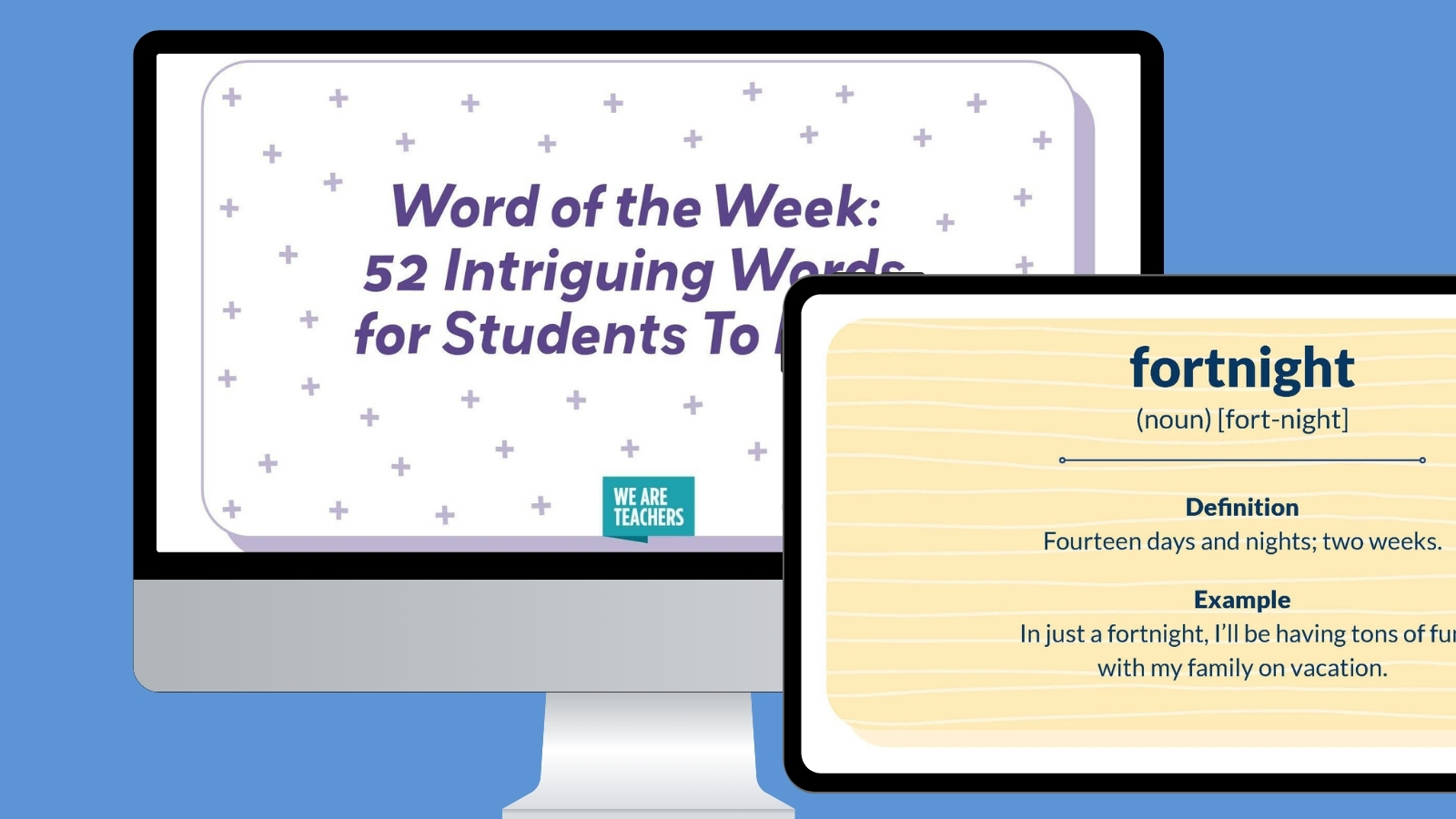Want to start teaching your students a unique word every week? Word of the Week is a fun and easy way to build student vocabulary and expand language skills. Learn how to introduce the words and check out the activity ideas below. Plus, be sure to download our free Google Slides deck featuring 52 words—one for each week of the year!
Introducing Word of the Week
Word of the Week is a fantastic way to build vocabulary, especially at the elementary level, by introducing students to a new word each week. This practice expands their language skills and encourages them to express themselves more precisely and creatively. Plus, it’s fun to challenge students with intriguing and uncommon words.
Fun fact: Word of the Week is often referred to by the acronym WOW, reflecting the excitement it brings to the classroom!
Below, you’ll find engaging vocabulary activities that teach word meanings, expand vocabulary, and improve reading and writing skills. Experience the perks of classroom games as students engage in learning disguised as fun.
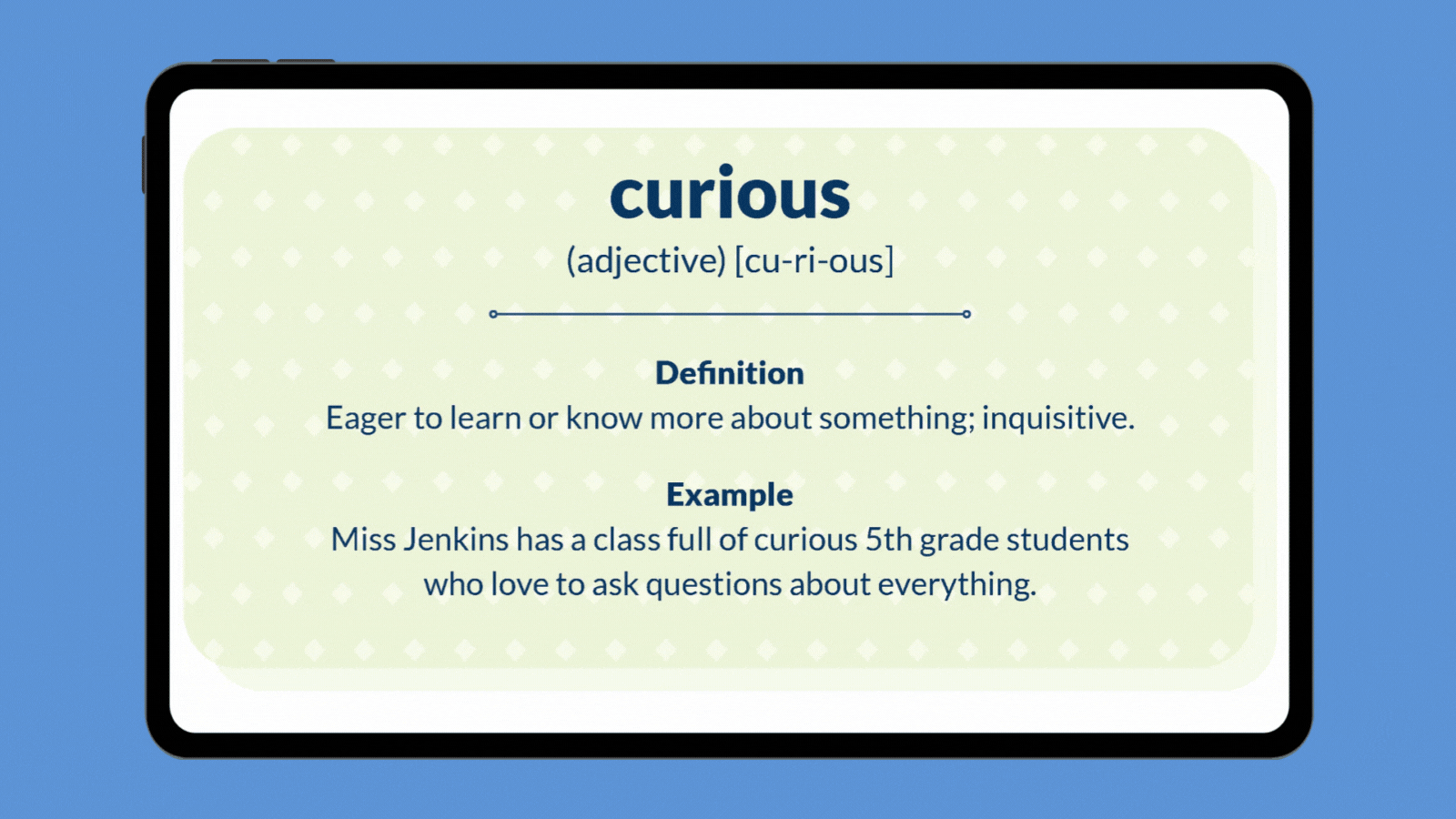
Word of the Week Activities
Explore interactive exercises that ignite students’ interest in expanding their vocabulary, and boost excitement for language learning while you’re at it. Studying a new word each week is not only beneficial for elementary students, it’s also fun! From interactive games to hands-on projects, these activities foster creativity and deepen students’ understanding of language.
Roll the Die
Give this engaging dice game for kids a try with your students. Offering six thought-provoking activities to do with the weekly word, there’s all sorts of learning to be had here. Players eagerly anticipate their task with each roll, adding excitement to their exploration of the new word.
Here’s an example of six tasks students can do with the word they are focusing on, one for each roll of the dice.
Roll 1 – Write the word in a sentence using more than six words.
Roll 2 – Draw a picture to express the word.
Roll 3 – Write a newspaper headline that includes the word.
Roll 4 – Write the definition of the word in your own words.
Roll 5 – Find the Scrabble score of the word.
Roll 6 – Count the number of vowels and consonants in the word.
And why settle for one die when you can roll two dice? It’s double the fun for students as they take on the tasks assigned from each roll.
However you choose to play, your students will benefit from the experience.
Scavenger Hunt
Everyone loves a fun scavenger hunt! This one takes some prep work, but it’s worth it for all the learning involved.
Start by writing down and then hiding the weekly word in a creative spot within the classroom or designated play area. Next, write a series of 5 to 10 clues that will lead children to other clues, eventually arriving at the hidden word.
Divide students into teams and distribute a different clue to each group. This way, they will follow different paths and the scavenger hunt will be more engaging and challenging for everyone involved.
As students progress through the scavenger hunt, moving from clue to clue, they eventually reach the final destination where the concealed Word of the Week awaits. Once found, students are tasked with making a sentence, written or verbal, that showcases the word’s meaning in context. Finally, gather the group for sentence sharing, reflection, and discussion, reinforcing the word’s meaning and proper use.
This activity builds grammar and reading skills and fosters teamwork and critical thinking.
Word of the Week Relay Race
Relay races are a hit with elementary kids, blending teamwork and excitement into one thrilling activity.
To begin this vocabulary relay race, split the class into teams. To start the race, one student from each team will hop over to the board or a designated writing area with a writing utensil in hand. Once there, they write a sentence using the Word of the Week, demonstrating their understanding and creativity under pressure. They then speed-walk back to their team to pass the writing utensil to the next student, who continues the process. This creates a collection of sentences using the same word.
With each team member’s turn, the momentum builds as students create pretty impressive sentences. The race continues until each team member has contributed one sentence, culminating in a thrilling display of teamwork and linguistic agility.
Through this activity, students reinforce their understanding of the word and hone their writing skills. Transform vocabulary practice into an exciting event that leaves students eager for more challenges with this relay race.
Vocabulary Notebook
Students can add the Word of the Week and its definition to a designated vocabulary notebook weekly. This simple practice helps them remember and incorporate these new words into their everyday language.
Encourage students to deepen their understanding by noting the word’s part of speech and a couple of its synonyms. They can also practice using the word in sentences to grasp its usage better. As a bonus, challenge students at the end of the month to use their newly acquired words in a paragraph.
Using a vocabulary notebook helps students learn new words, improve their writing, and foster a genuine appreciation for language.
Word Collage Bonanza
To start this activity, students explore the meaning of the Word of the Week. Then, equipped with scissors, glue, and a colorful array of materials such as magazines, newspapers, stencils, vibrant paper, and writing utensils, students set off on the process of creating collages that visually represent the word they are studying.
As they carefully cut out words, letters, and images, students are prompted to think deeply about how each piece contributes to the overall portrayal of the word’s meaning. They can use synonyms, related words, images, and even drawings to craft a beautiful collage, but there’s a twist: They can’t use the actual Word of the Week itself.
Not including the word in their collages encourages students to think creatively and critically about its meaning, helping them better understand and engage with the vocabulary concept.
Once the collages are complete, display them in the classroom as a visual reminder of the word’s meaning and the classroom’s artistic talent, reinforcing vocabulary retention and promoting a vibrant learning environment.
Synonym Scramble
Students are invited to explore the vast landscape of language by creating a dynamic word web of synonyms.
Starting with the Word of the Week, students research synonyms for that word and keep building a web that shows the richness of language.
Word connections will be mapped out as students construct an intricate web of words that highlight the richness and diversity of the English language.
This engaging synonym activity not only expands students’ vocabulary but also deepens their understanding of word relationships. Making synonym exploration fun turns learning new words into an exciting adventure, leaving students eager to expand their vocabulary.
Compose an Acrostic Poem
Add a splash of creativity and vocabulary building to your poetry unit with this activity.
Students will write an acrostic poem using the Word of the Week. An acrostic poem is a form of poetry where the first letter of each line spells out a word or message vertically.
Encourage students to share their poems with classmates, sparking discussion to deepen everyone’s understanding of the word. Hearing peers’ perspectives opens their minds to the beauty of poetry, fostering an appreciation for language and creativity.
52 Word of the Week Picks
Ready to expand your word collection? We’ve compiled an amazing list of words, perfect for boosting elementary learning and great for middle and high school too.
Explore our list of 52 words, one for each week of the year. Plus, make teaching a breeze with our convenient Google Slides download for seamless integration into your classroom activities.
curious (adjective) [cu-ri-ous]

Eager to learn more about something; inquisitive.
Example
Miss Jenkins has a class full of curious 5th grade students who love to ask questions about everything.
wander (verb) [wan-der]
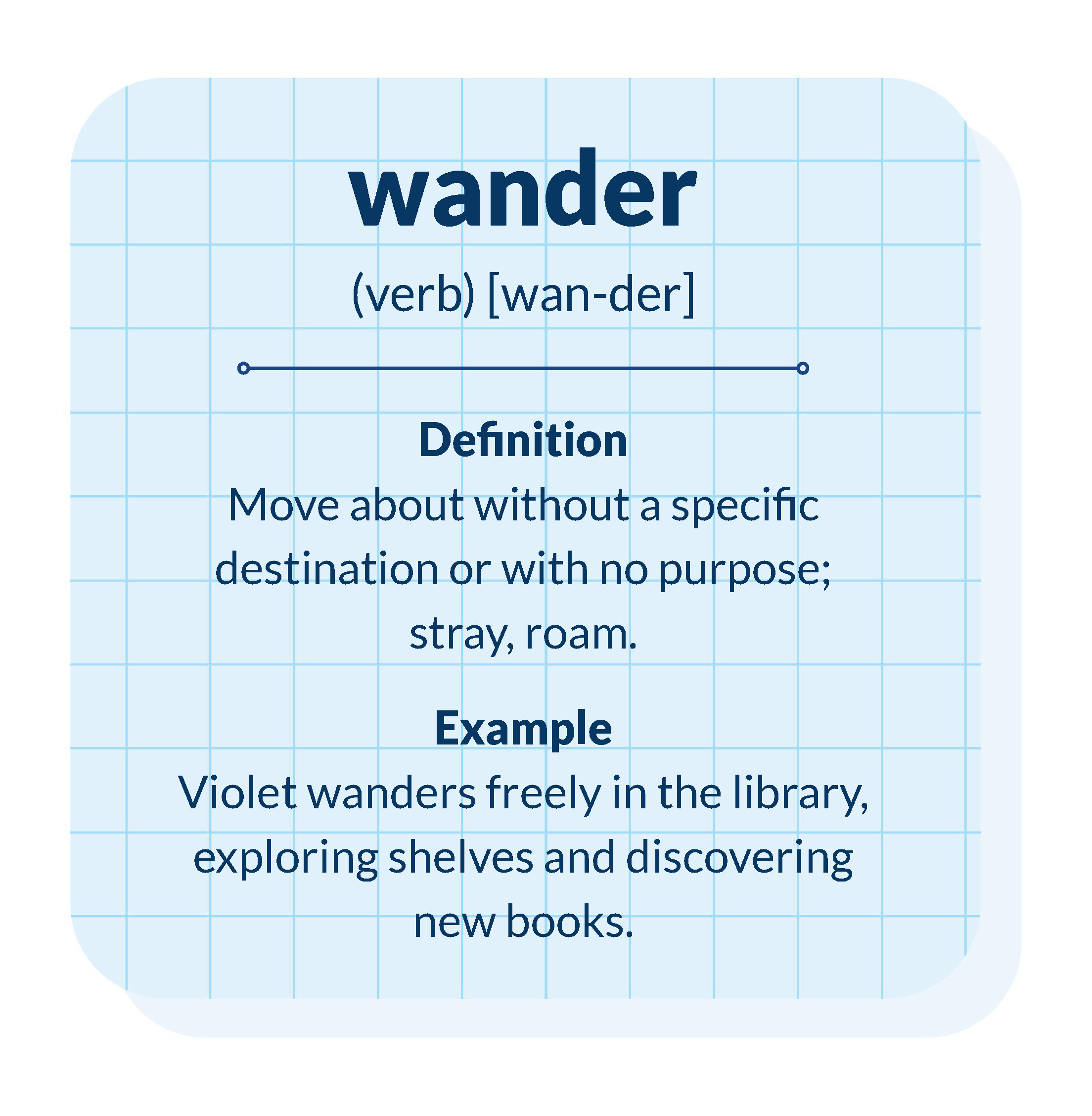
Move about without a specific destination or with no purpose; stray, roam.
Example
Violet wanders freely in the library, exploring shelves and discovering new books.
scrumptious (adjective) [scrump-tious]
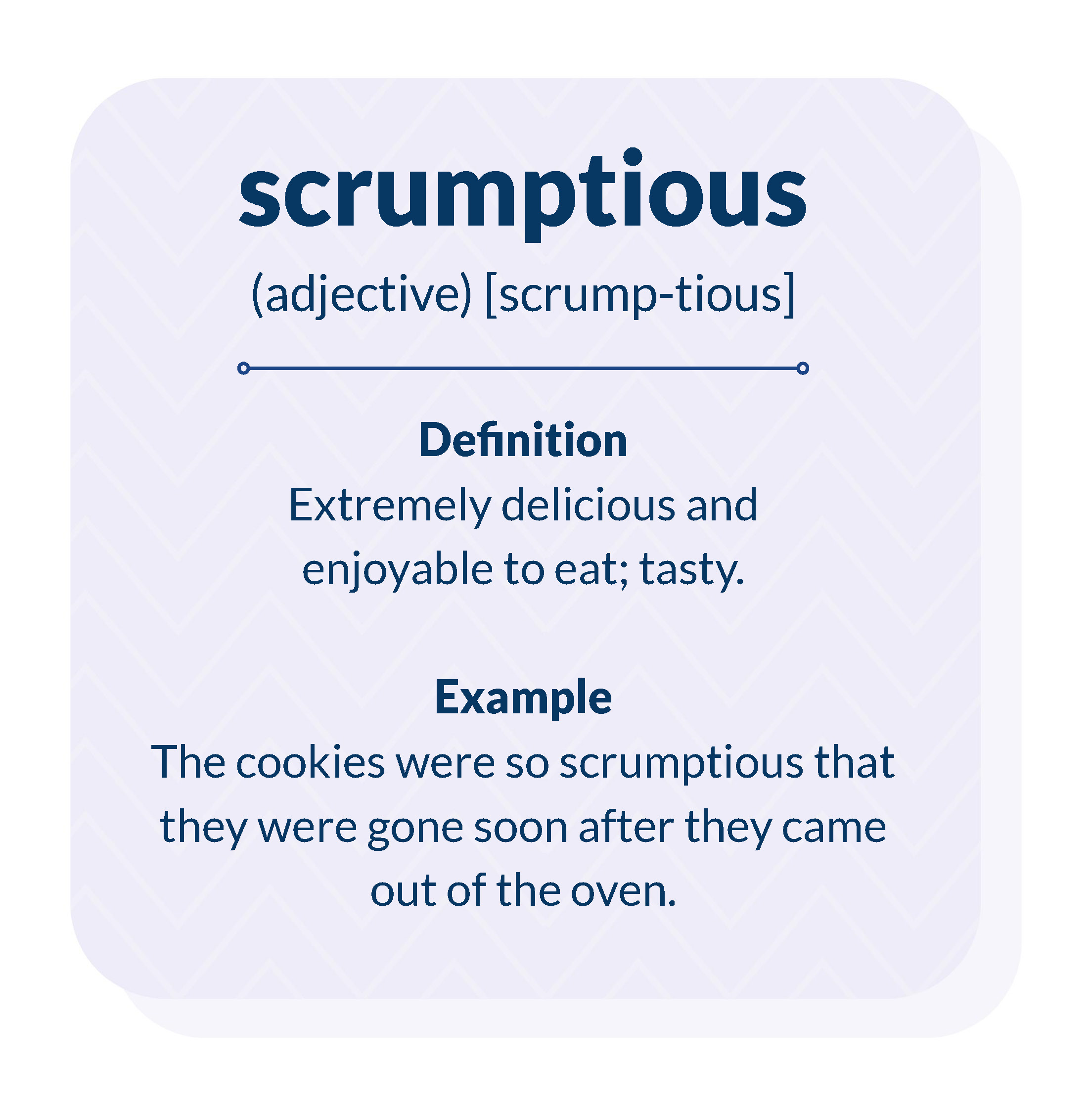
Extremely delicious and enjoyable to eat; tasty.
Example
The cookies were so scrumptious that they were gone soon after they came out of the oven.
fortnight (noun) [fort-night]
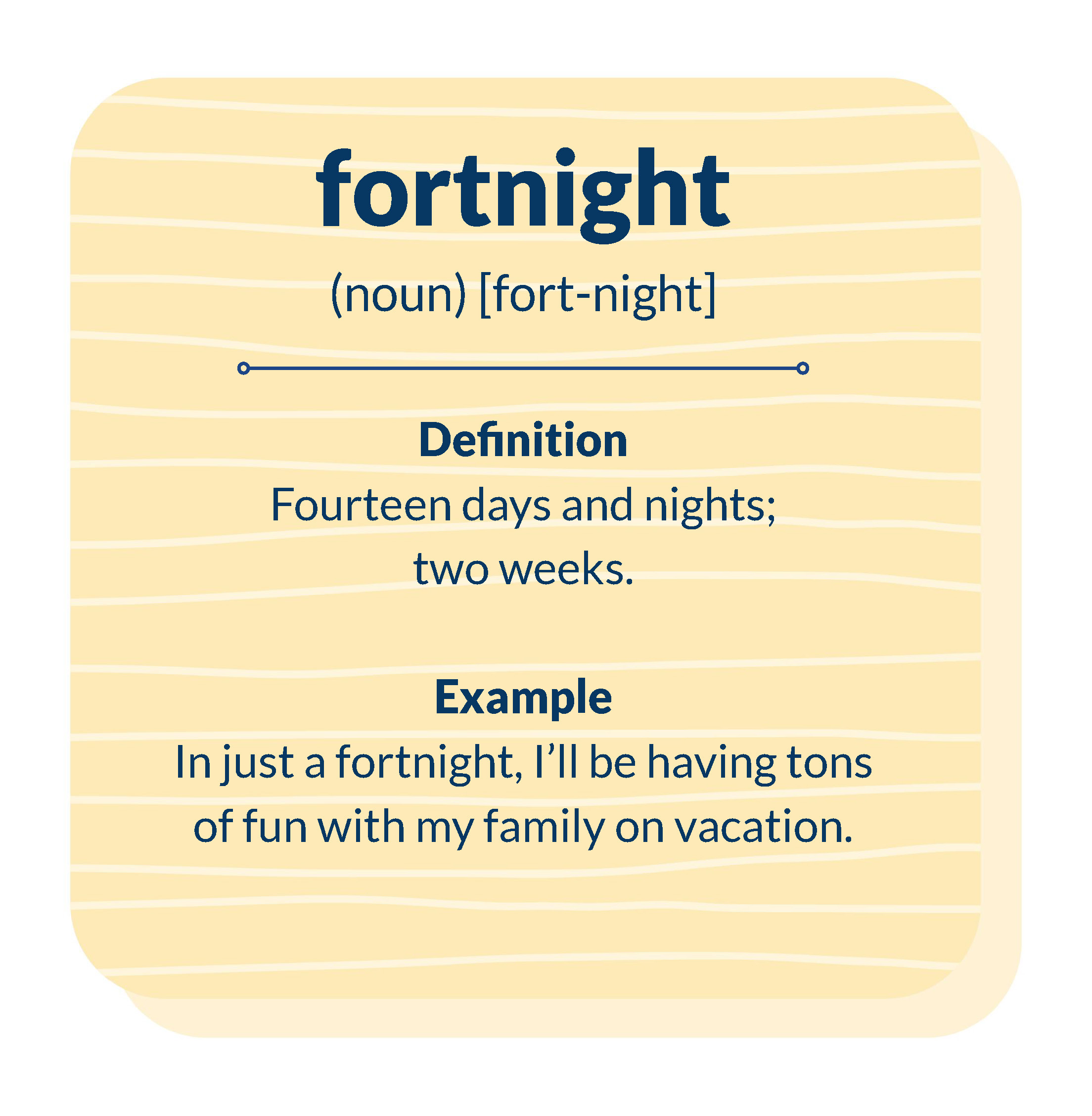
Fourteen days and nights; two weeks.
Example
In just a fortnight, I’ll be having tons of fun with my family on vacation.
impeccable (adjective) [im-pec-ca-ble]
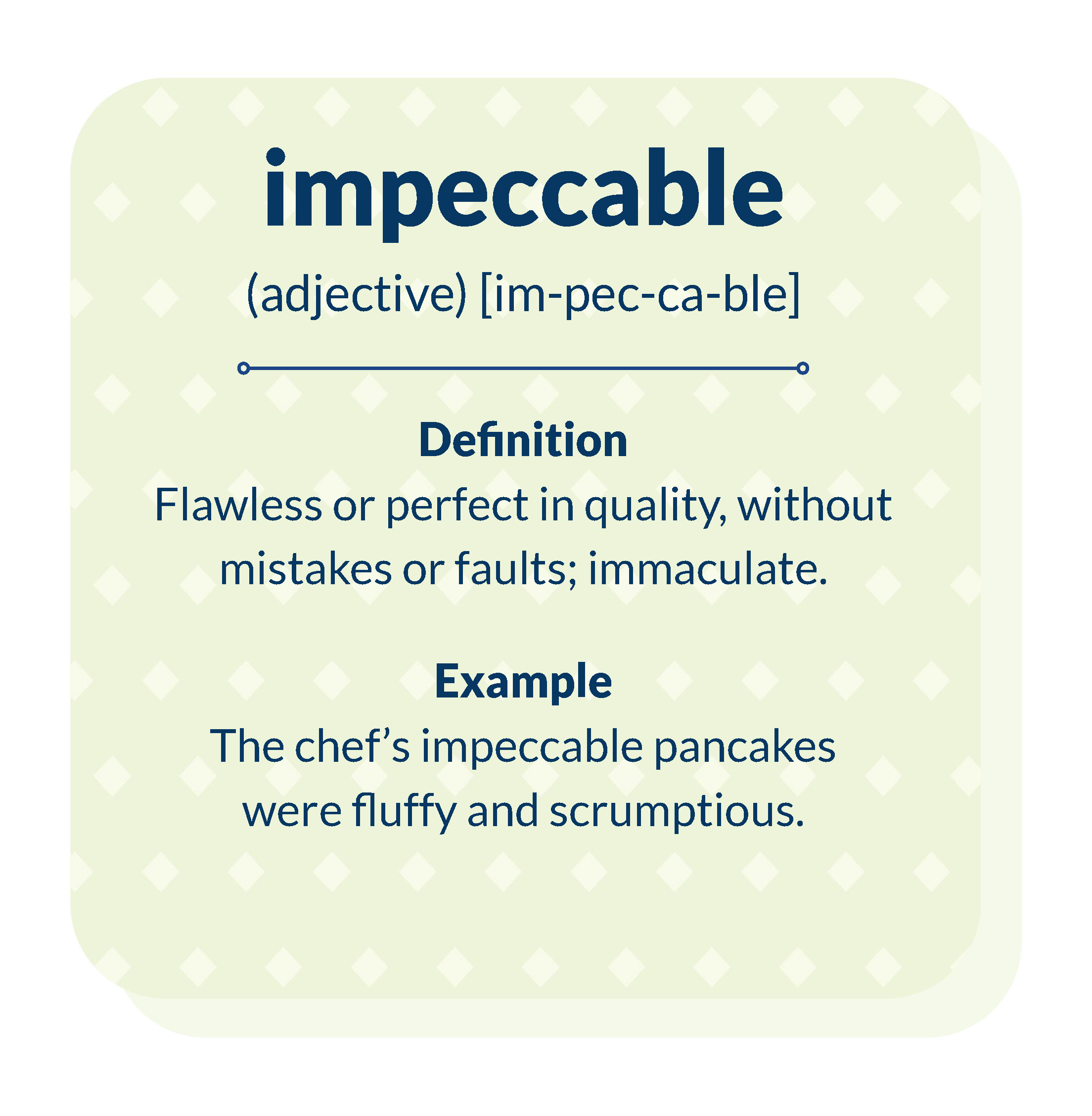
Flawless or perfect in quality, without mistakes or faults; immaculate.
Example
The chef’s impeccable pancakes were fluffy and scrumptious.
strew (verb) [strew]
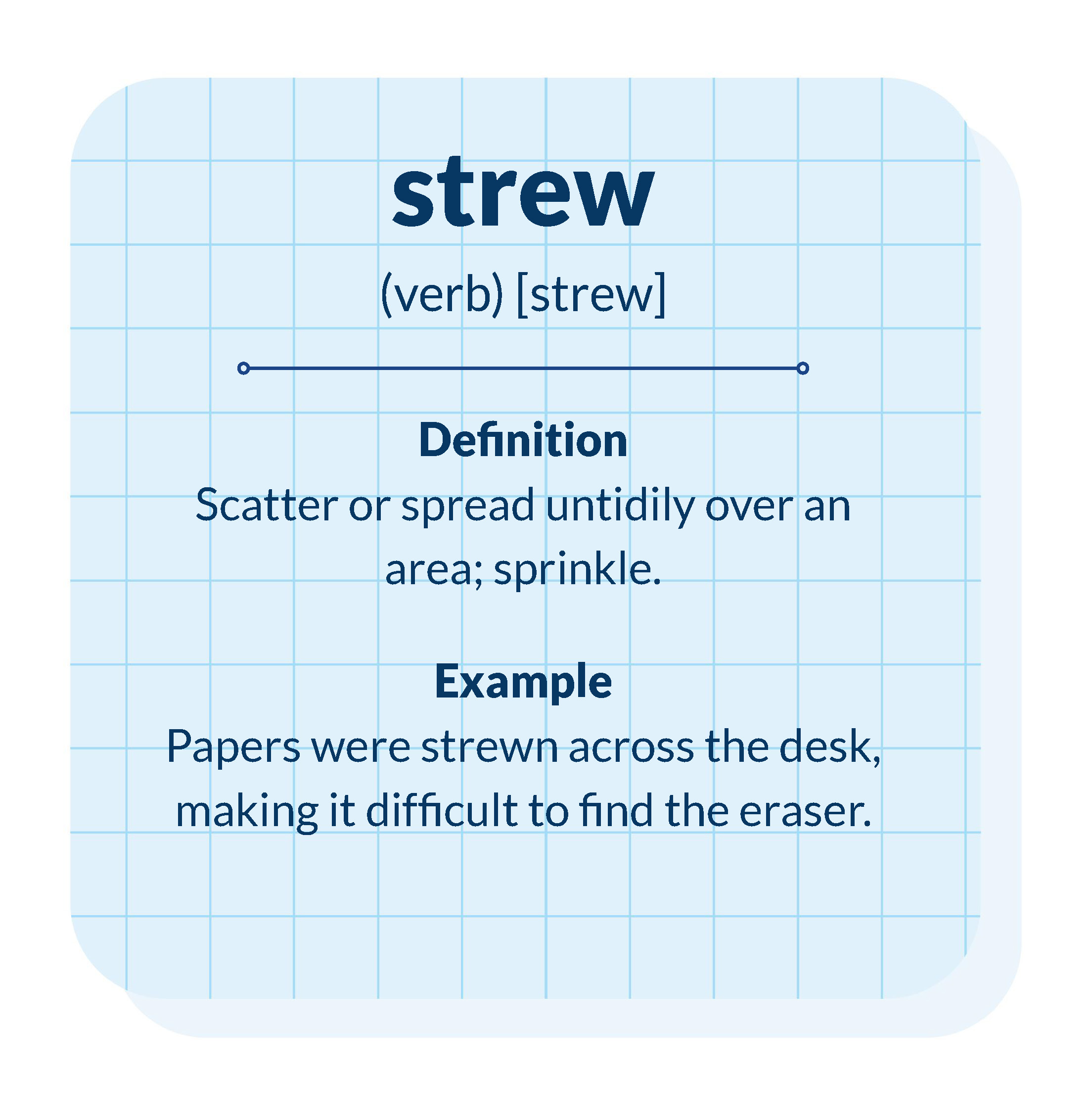
Scatter or spread untidily over an area; sprinkle.
Example
Papers were strewn across the desk, making it difficult to find the eraser.
supervision (noun) [su-per-vi-sion]
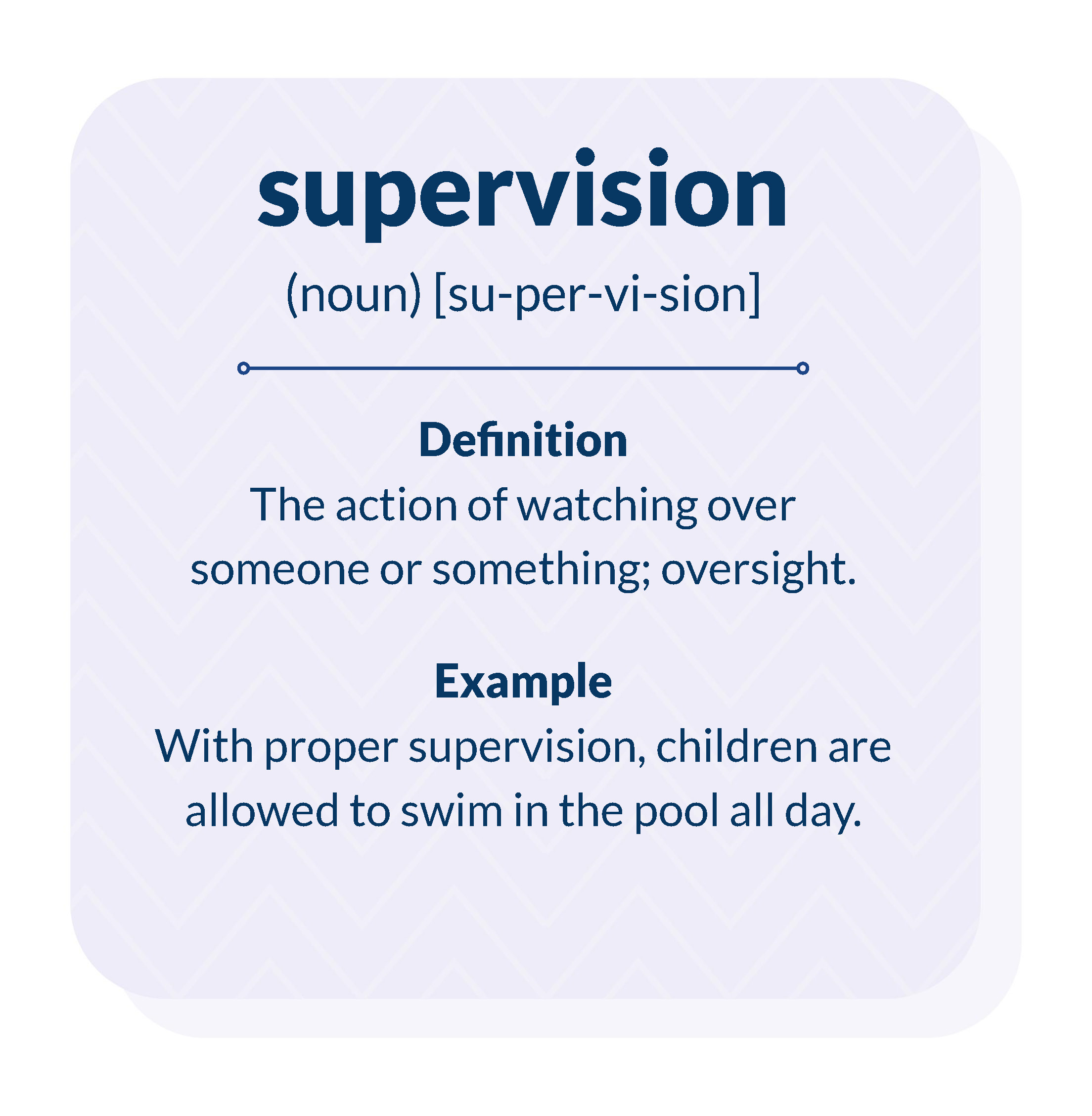
The action of watching over someone or something; oversight.
Example
With proper supervision, children are allowed to swim in the pool all day.
gleeful (adjective) [glee-ful]
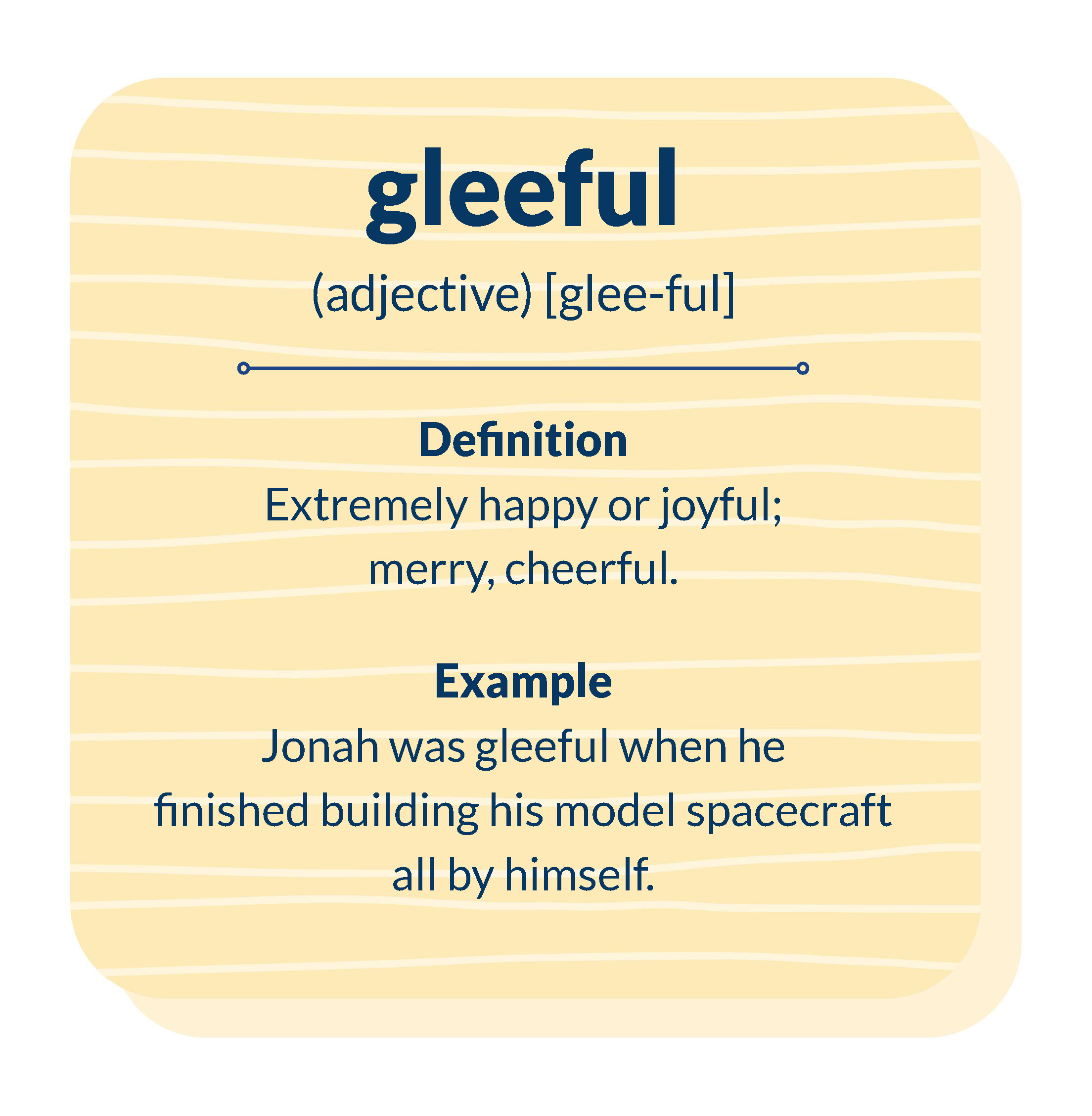
Extremely happy or joyful; merry, cheerful.
Example
Jonah was gleeful when he finished building his model spacecraft all by himself.
jeopardy (noun) [jeop-ar-dy]
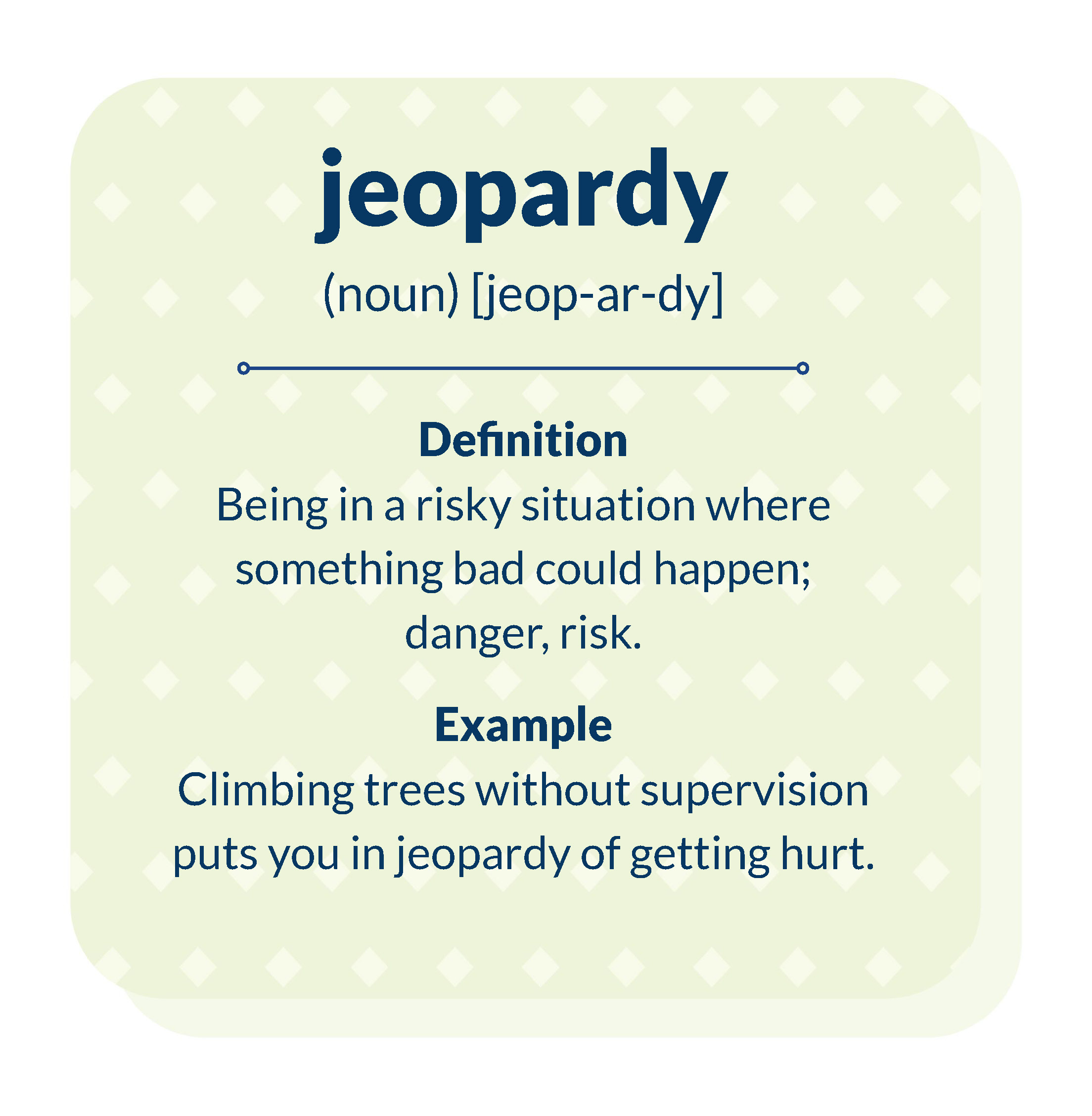
Being in a risky situation where something bad could happen; danger, risk.
Example
Climbing trees without supervision puts you in jeopardy of getting hurt.
empire (noun) [em-pire]
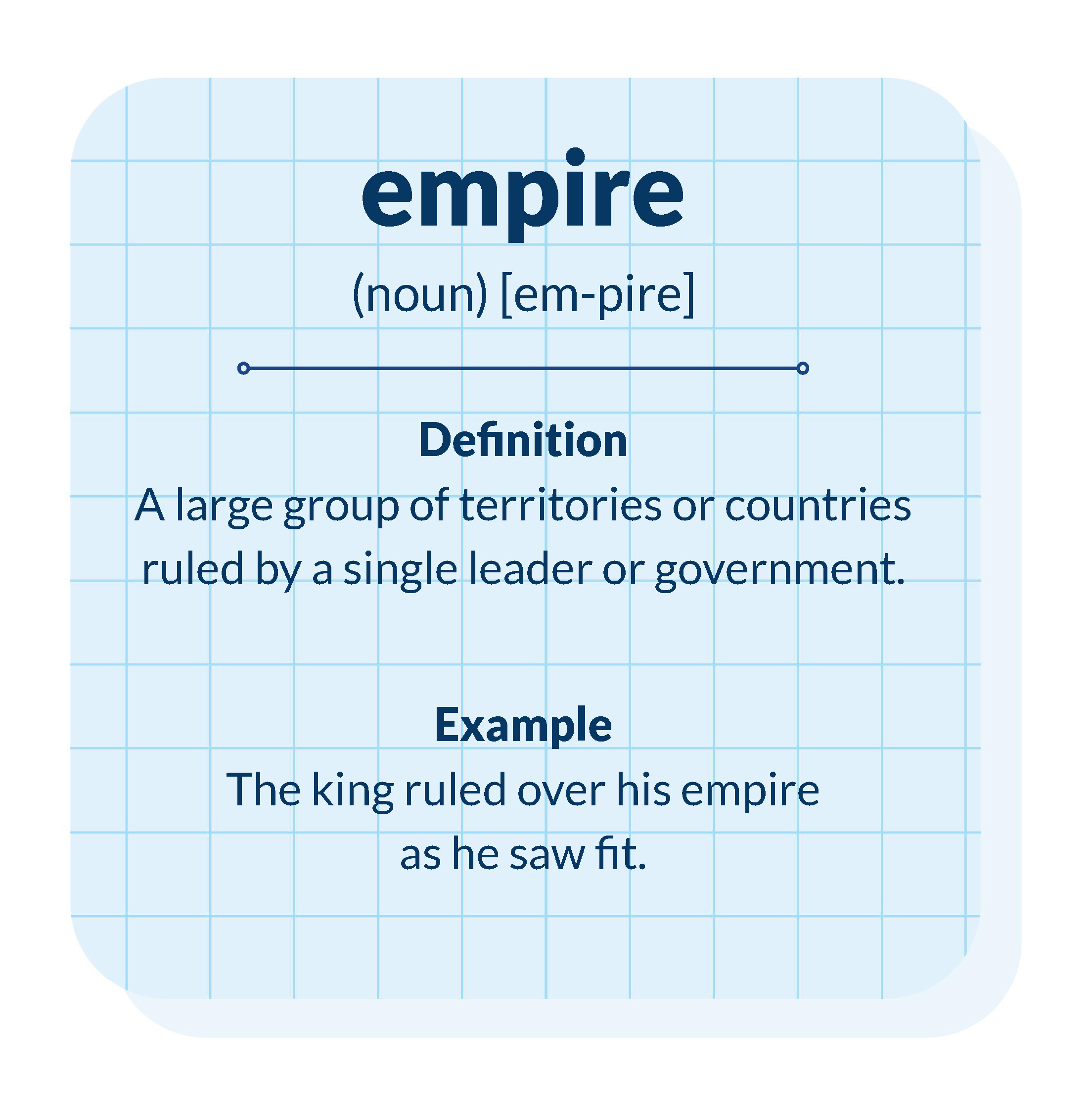
A large group of territories or countries ruled by a single leader or government.
Example
The king ruled over his empire as he saw fit.
spunky (adjective) [spun-ky]
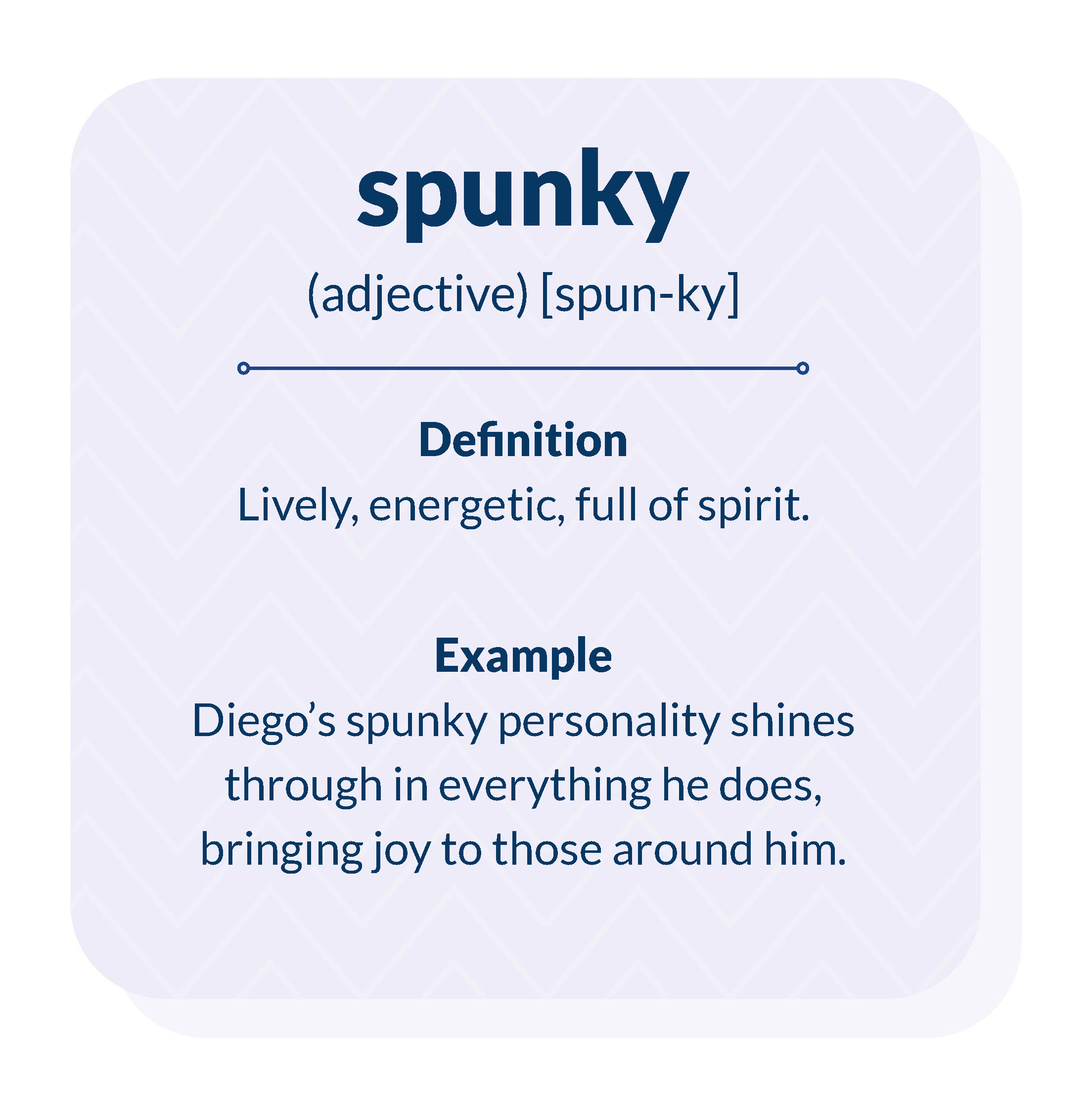
Lively, energetic, full of spirit.
Example
Diego’s spunky personality shines through in everything he does, bringing joy to those around him.
tycoon (noun) [ty-coon]
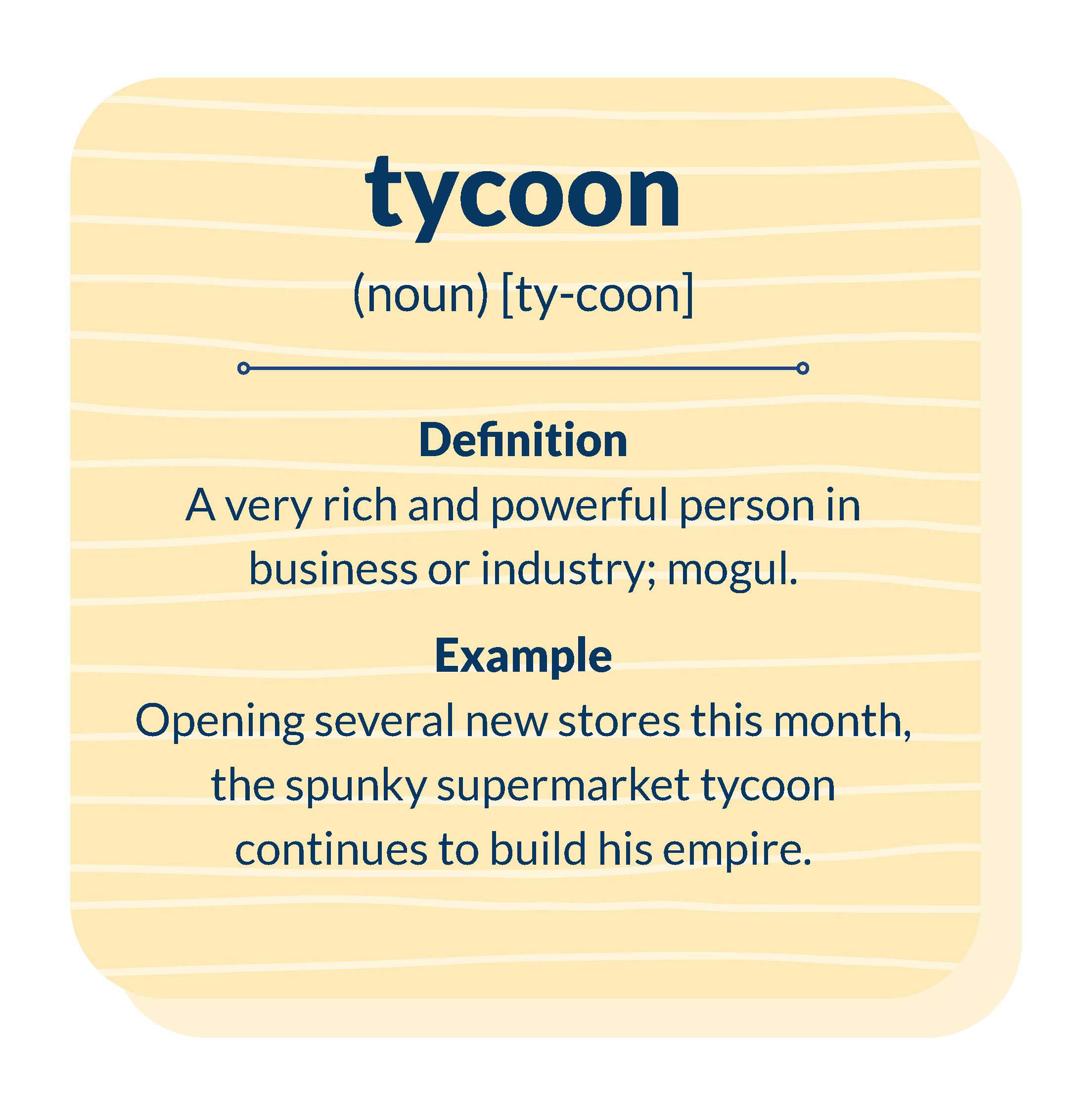
A very rich and powerful person in business or industry; mogul.
Example
Opening several new stores this month, the spunky supermarket tycoon continues to build his empire.
peculiar (adjective) [pe-cu-liar]
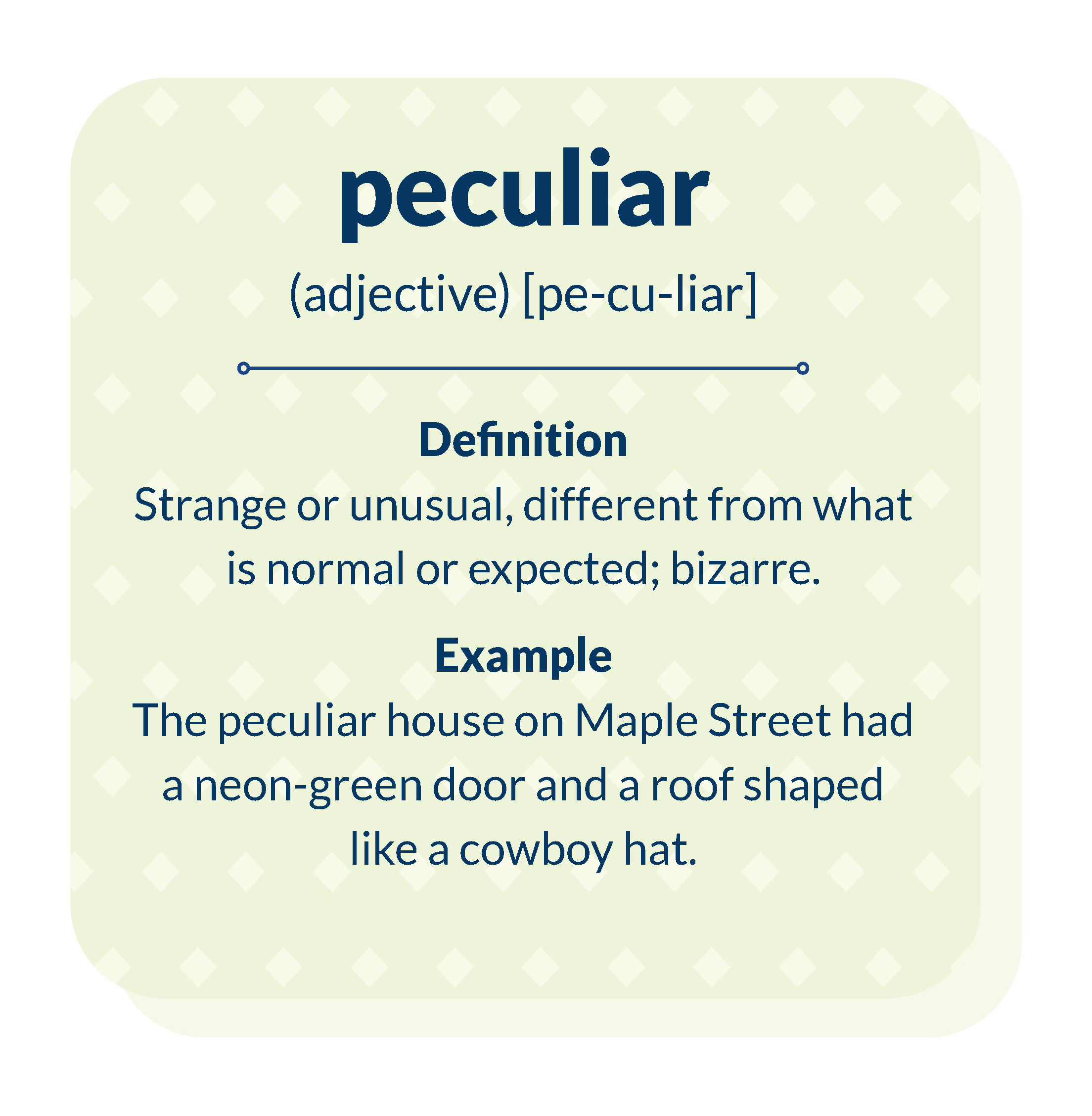
Strange or unusual, different from what is normal or expected; odd, bizarre.
Example
The peculiar house on Maple Street had a neon-green door and a roof shaped like a cowboy hat.
succumb (verb) [suc-cumb]
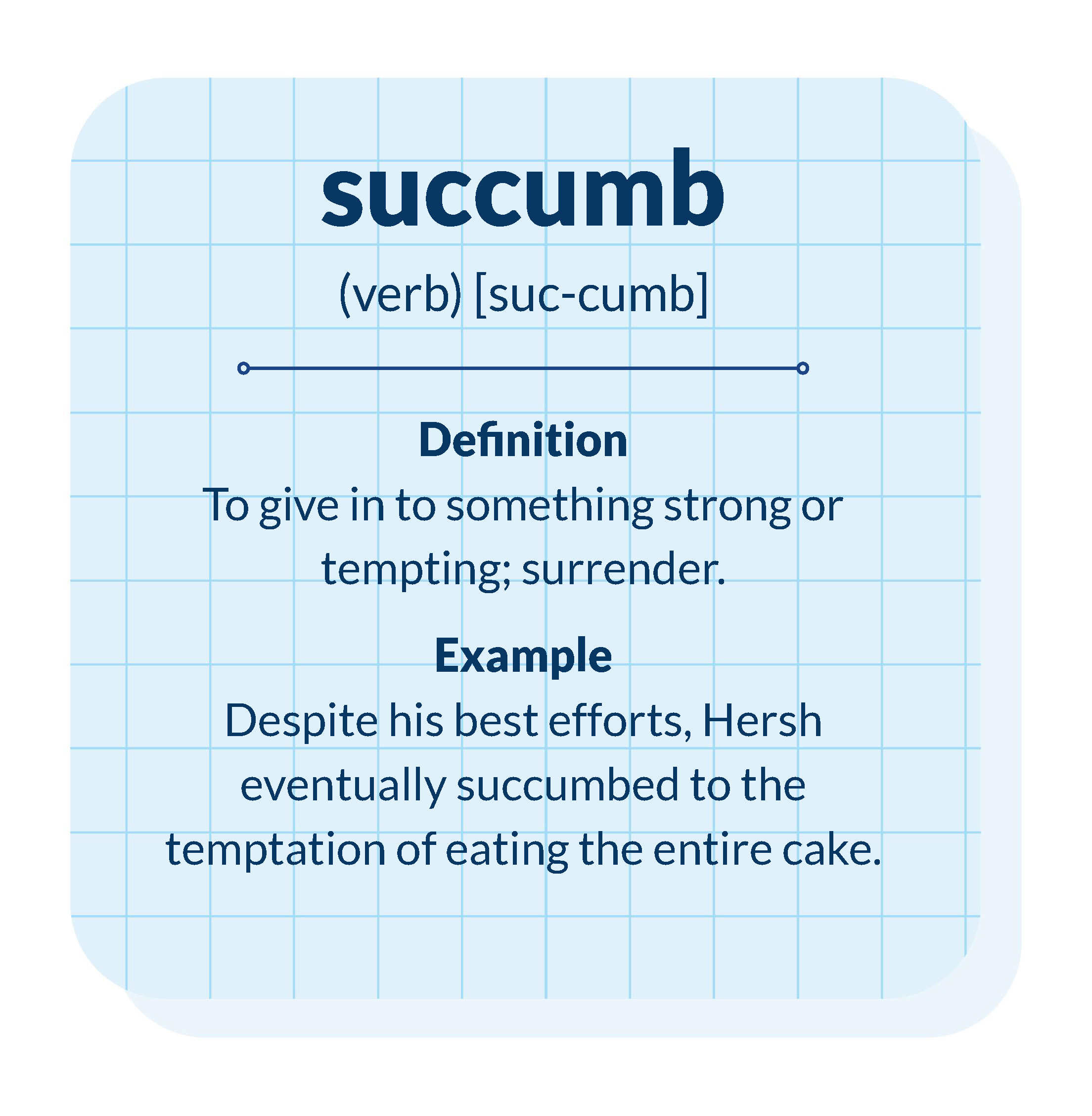
To give in to something strong or tempting; surrender.
Example
Despite his best efforts, Hersh eventually succumbed to the temptation of eating the entire cake.
authentic (adjective) [au-then-tic]
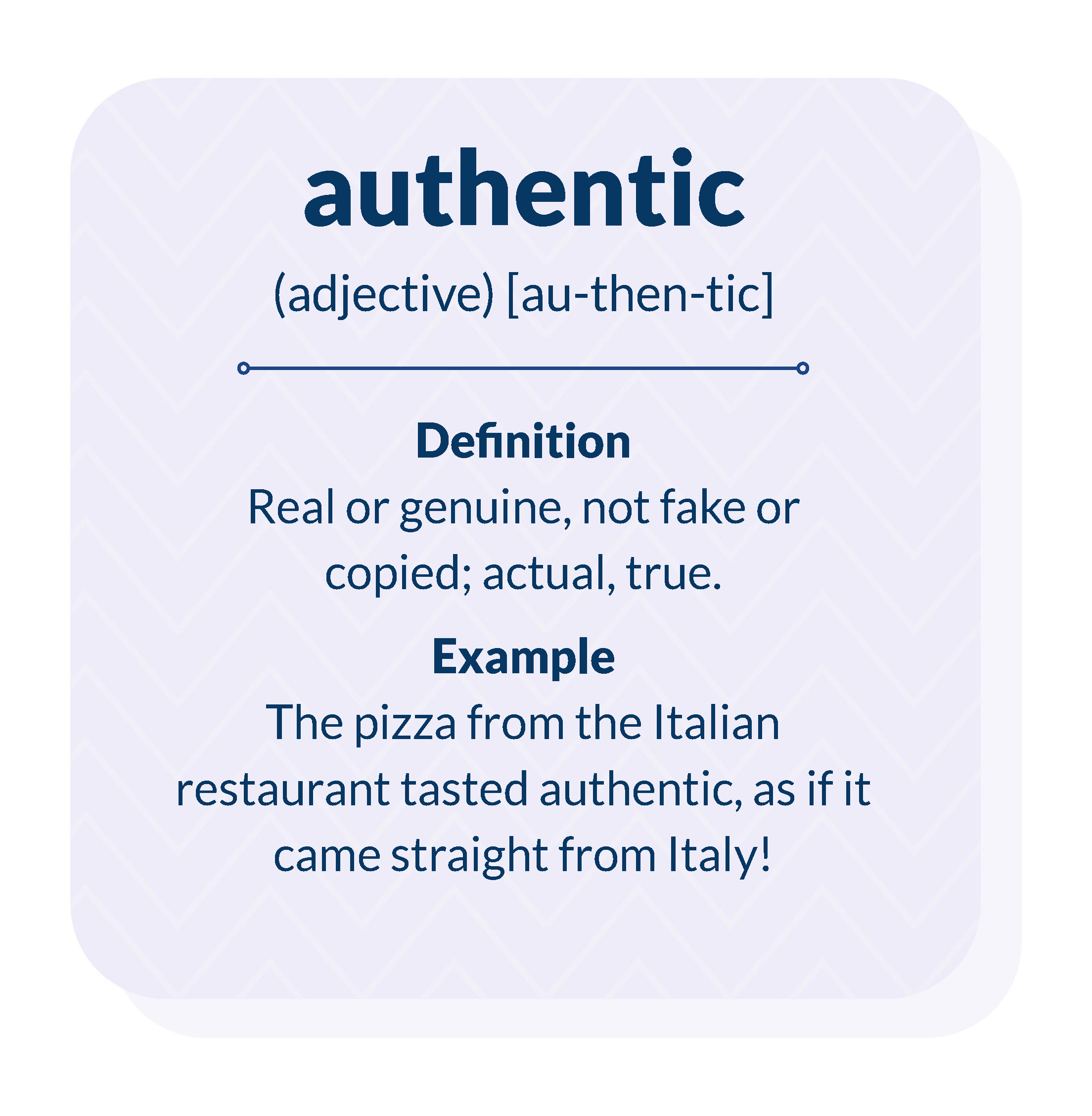
Real or genuine, not fake or copied; actual, true.
Example
The pizza from the Italian restaurant tasted authentic, as if it came straight from Italy!
vigilant (adjective) [vig-i-lant]
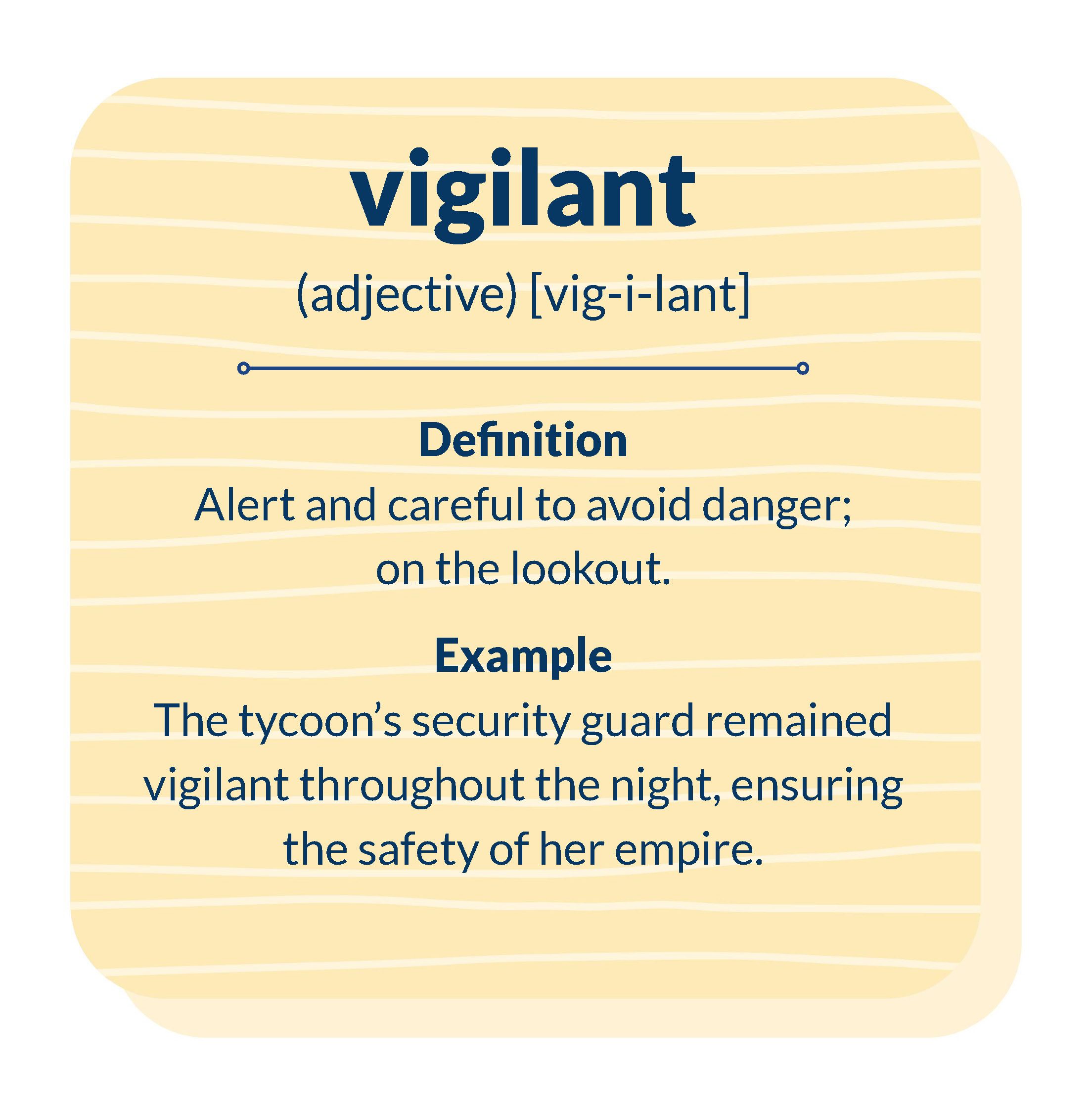
Alert and careful to avoid danger; on the lookout.
Example
The tycoon’s security guard remained vigilant throughout the night, ensuring the safety of her empire.
prolific (adjective) [pro-lif-ic]
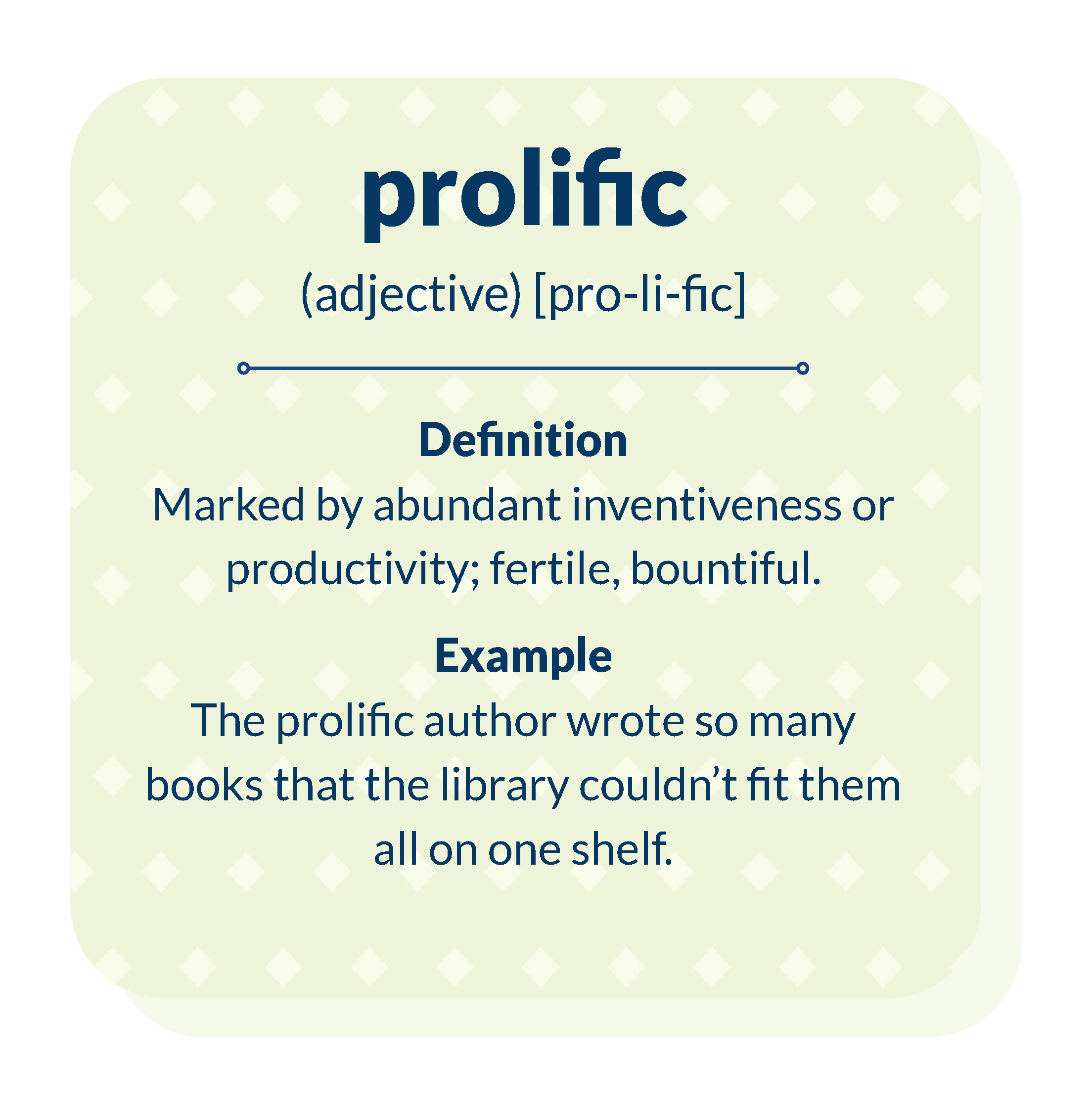
Marked by abundant inventiveness or productivity; fertile, productive, bountiful.
Example
The prolific author wrote so many books that the library couldn’t fit them all on one shelf.
summon (verb) [sum-mon]
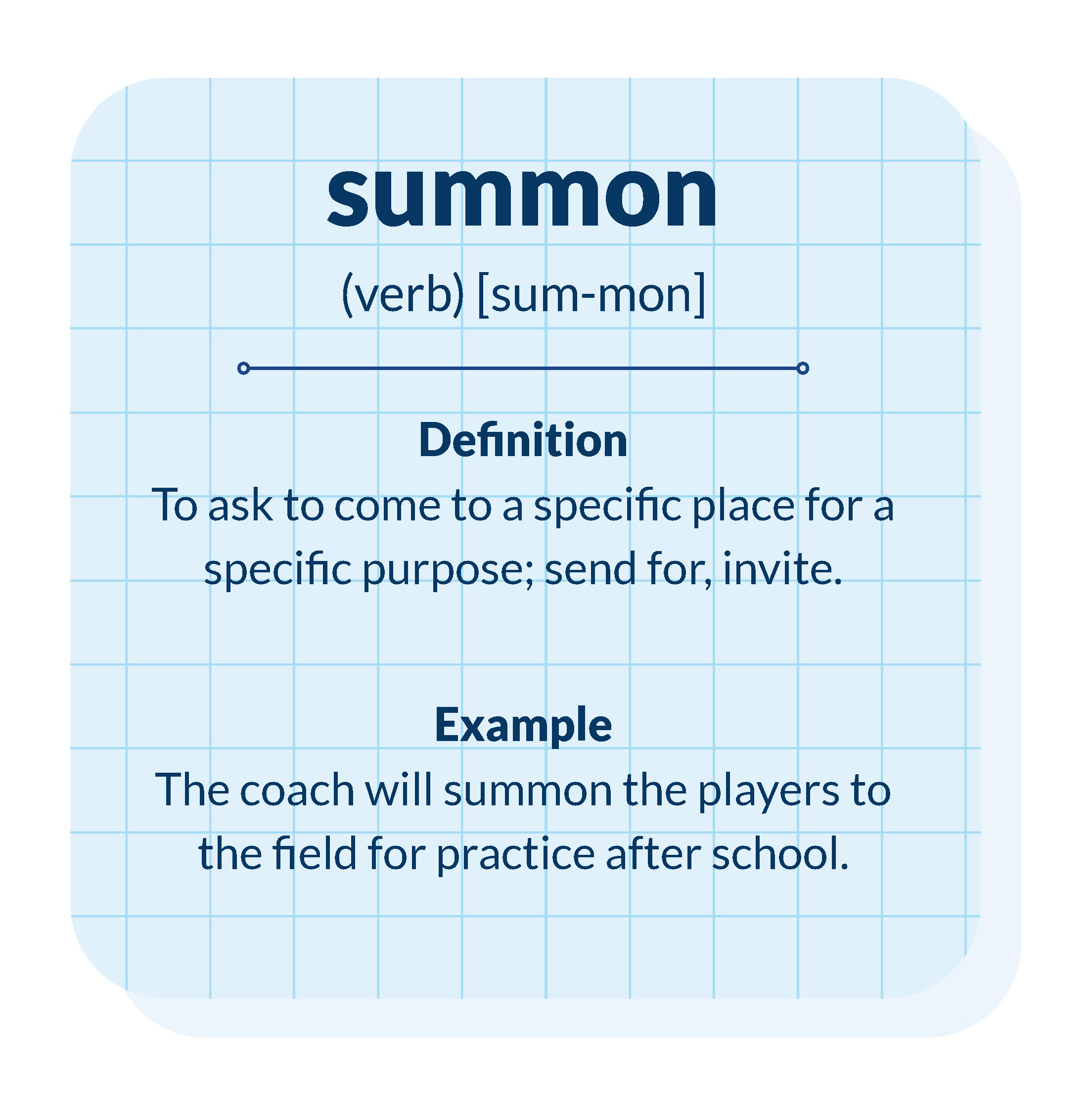
To ask to come to a specific place for a specific purpose; send for, invite.
Example
The coach will summon the players to the field for practice after school.
conceal (verb) [con-ceal]
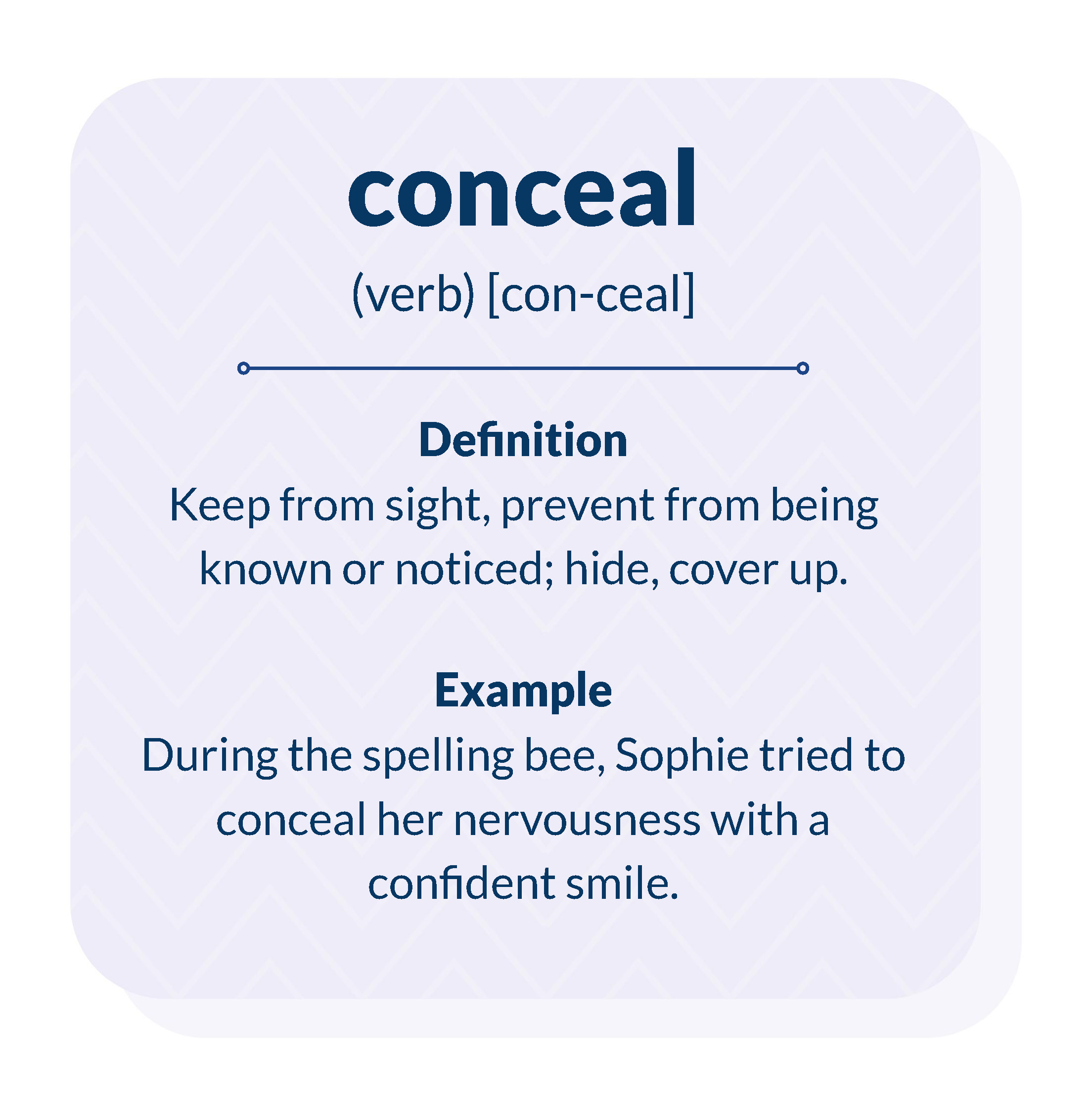
Keep from sight, prevent from being known or noticed; hide, cover up, disguise.
Example
During the spelling bee, Sophie tried to conceal her nervousness with a confident smile.
vibe (noun) [vibe]
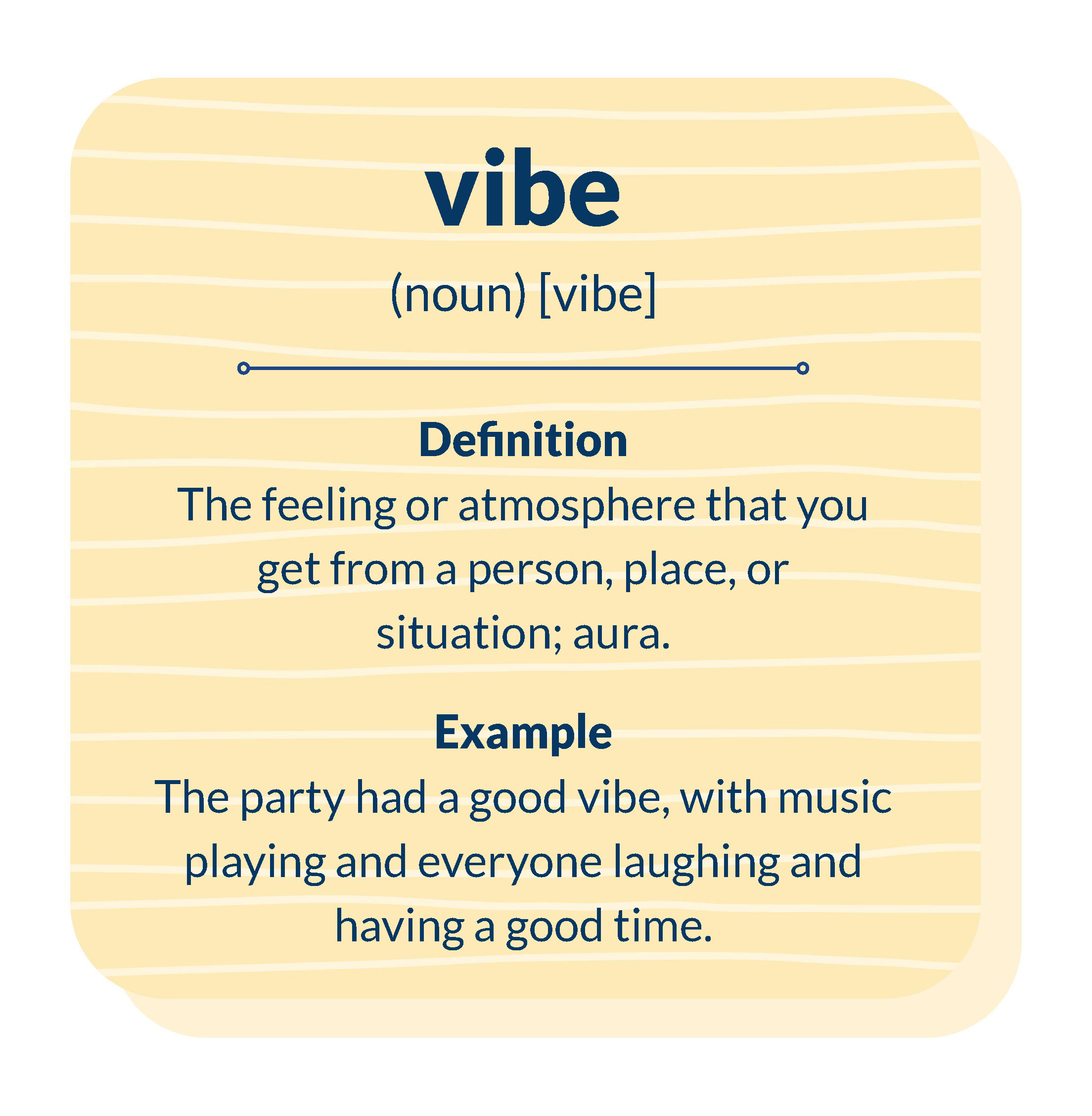
The feeling or atmosphere that you get from a person, place, or situation; aura.
Example
The party had a good vibe, with music playing and everyone laughing and having a good time.
ambition (noun) [am-bi-tion]
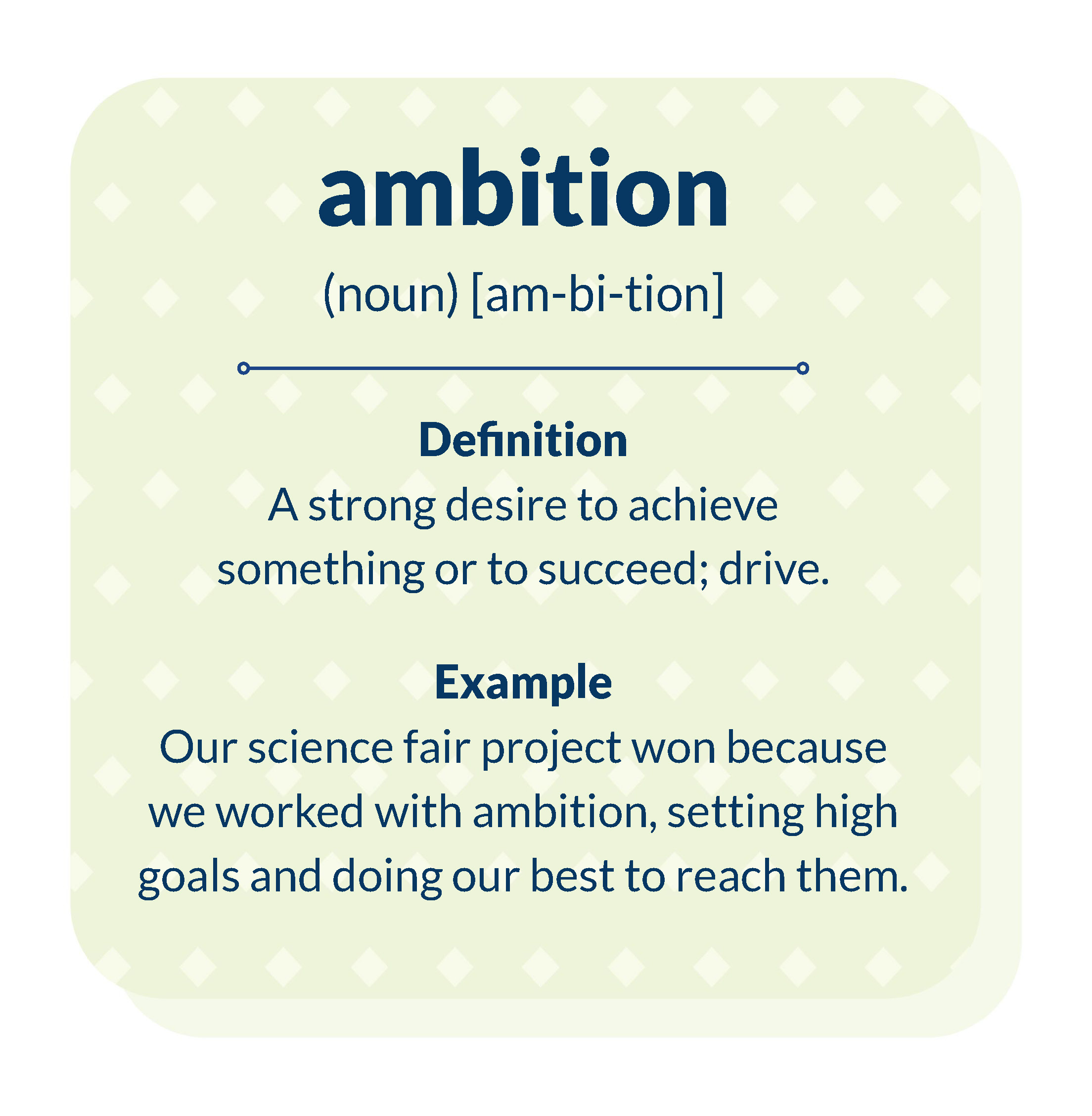
A strong desire to achieve something or to succeed; drive, aspiration.
Example
Our science fair project won because we worked with ambition, setting high goals and doing our best to reach them.
tranquil (adjective) [tran-quil]
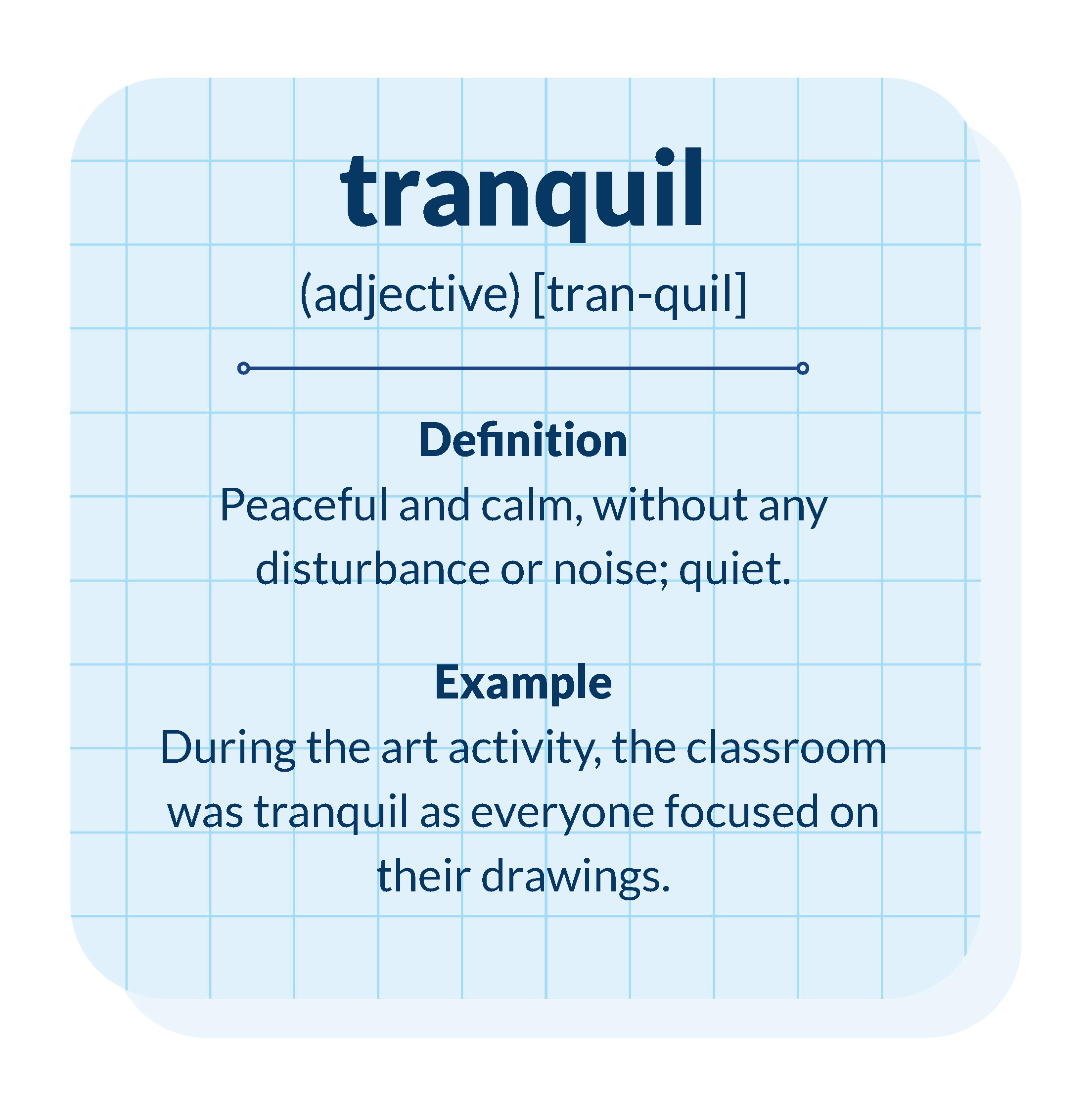
Peaceful and calm, without any disturbance or noise; quiet.
Example
During the art activity, the classroom was tranquil as everyone focused on their drawings.
versatile (adjective) [ver-sa-tile]
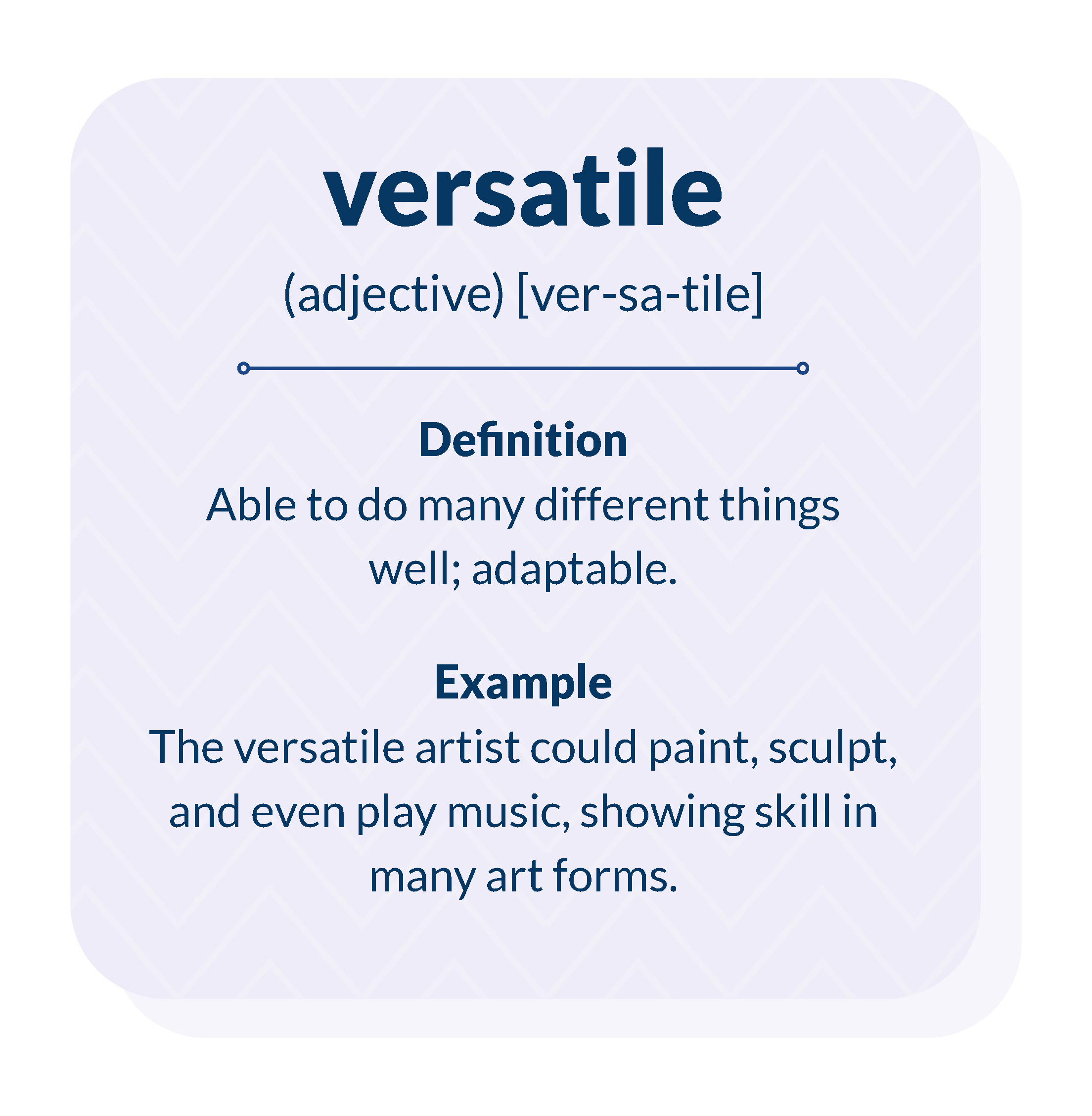
Able to do many different things well; adaptable.
Example
The versatile artist could paint, sculpt, and even play music, showing skill in many art forms.
affirm (verb) [af-firm]
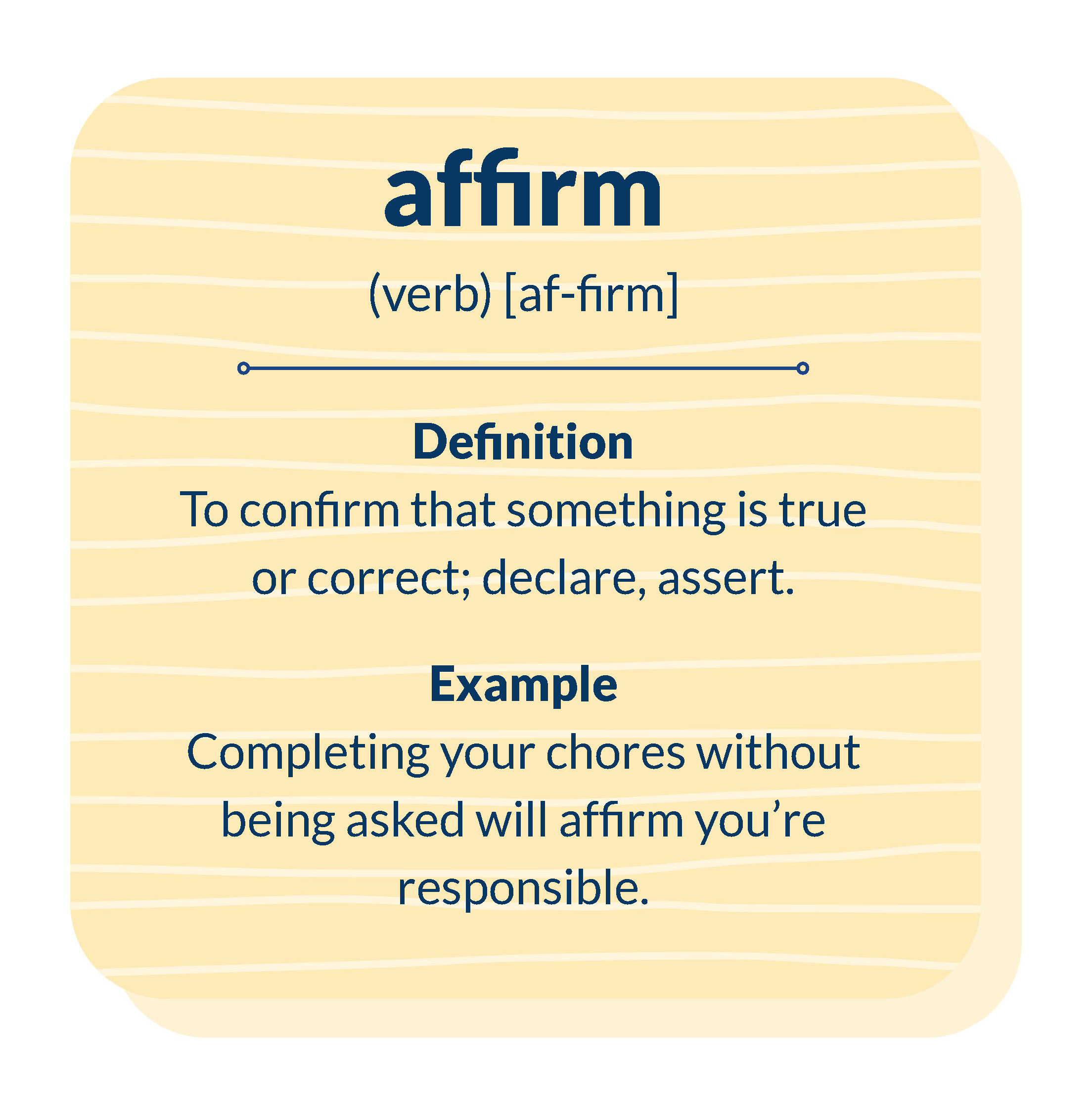
To confirm that something is true or correct; declare, assert.
Example
Completing your chores without being asked will affirm you’re responsible.
dynamic (adjective) [dy-na-mic]
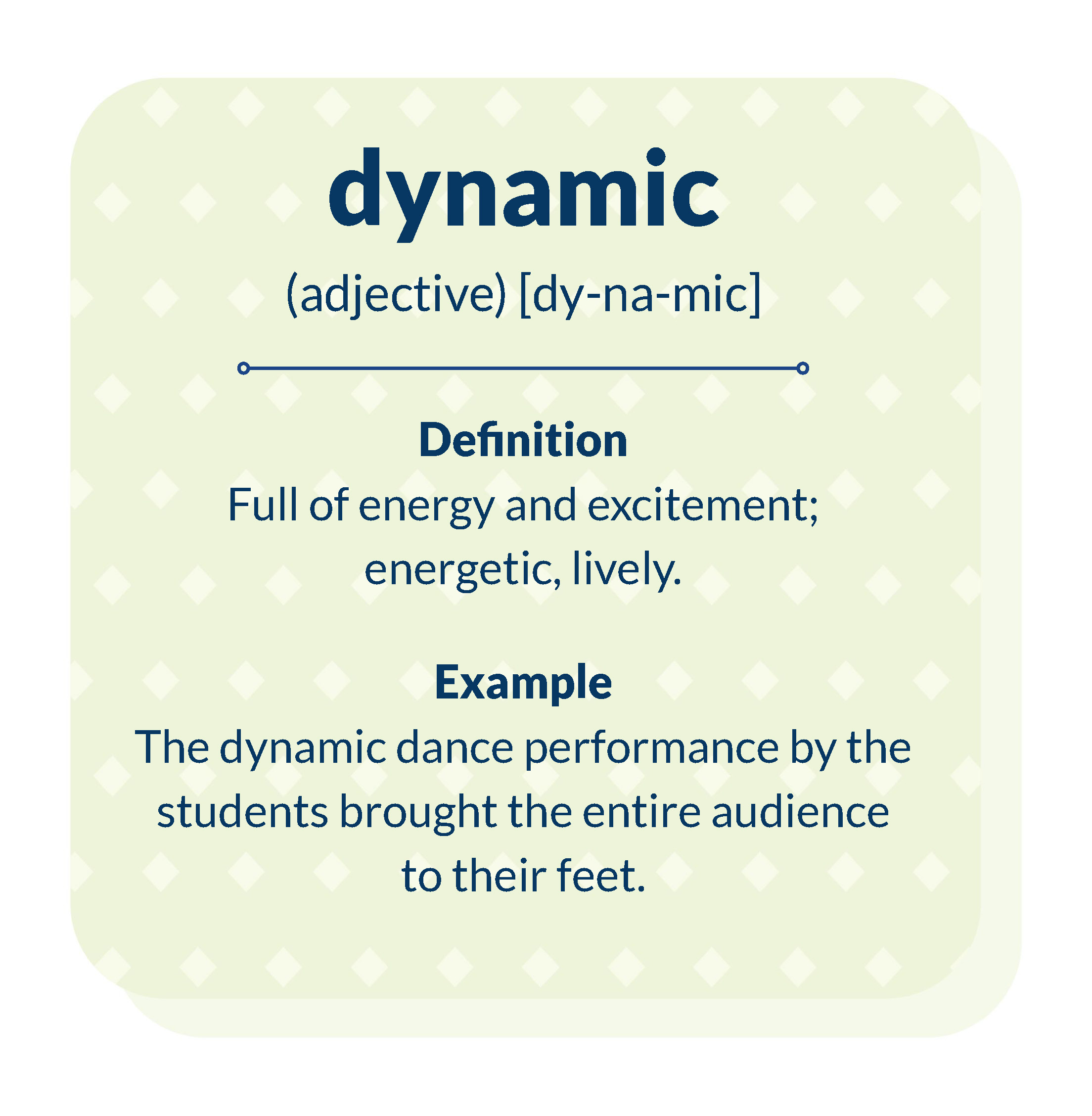
Full of energy and excitement; energetic, lively.
Example
The dynamic dance performance by the students brought the entire audience to their feet.
affable (adjective) [af-fa-ble]
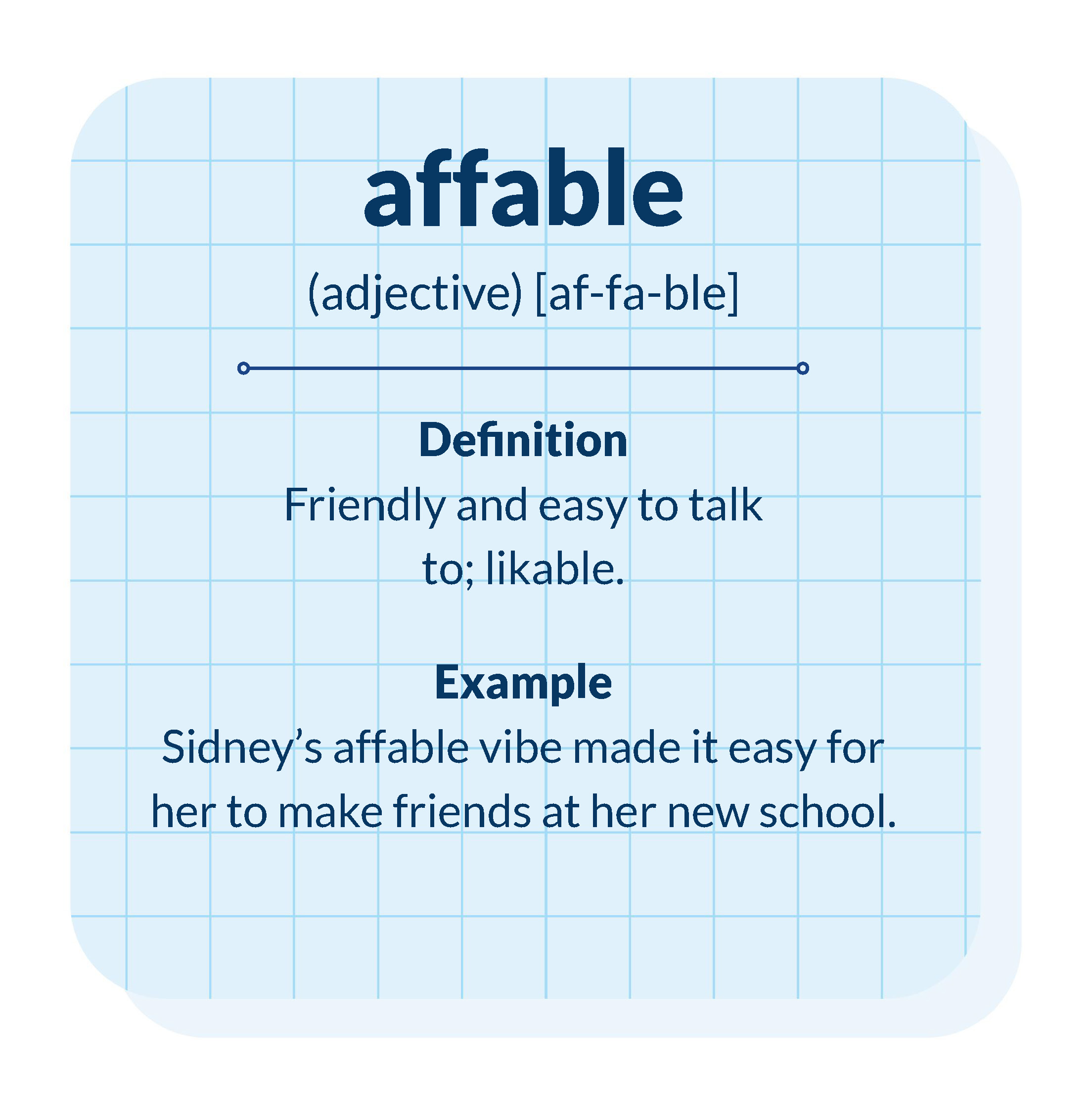
Friendly and easy to talk to; likable.
Example
Sidney’s affable vibe made it easy for her to make friends at her new school.
intuitive (adjective) [in-tu-i-tive]
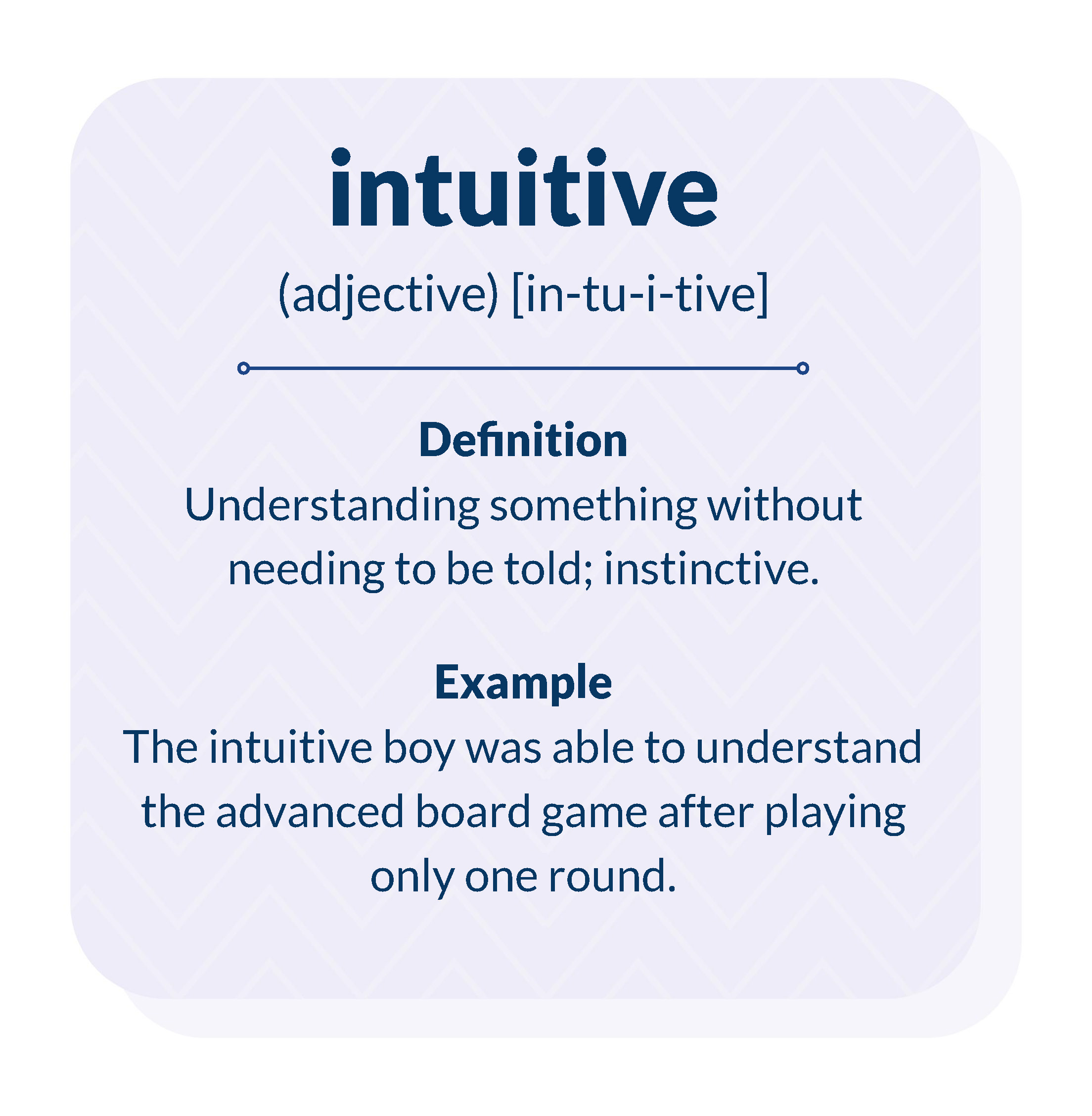
Understanding something without needing to be told; instinctive.
Example
The intuitive boy was able to understand the advanced board game after playing only one round.
radiant (adjective) [ra-di-ant]
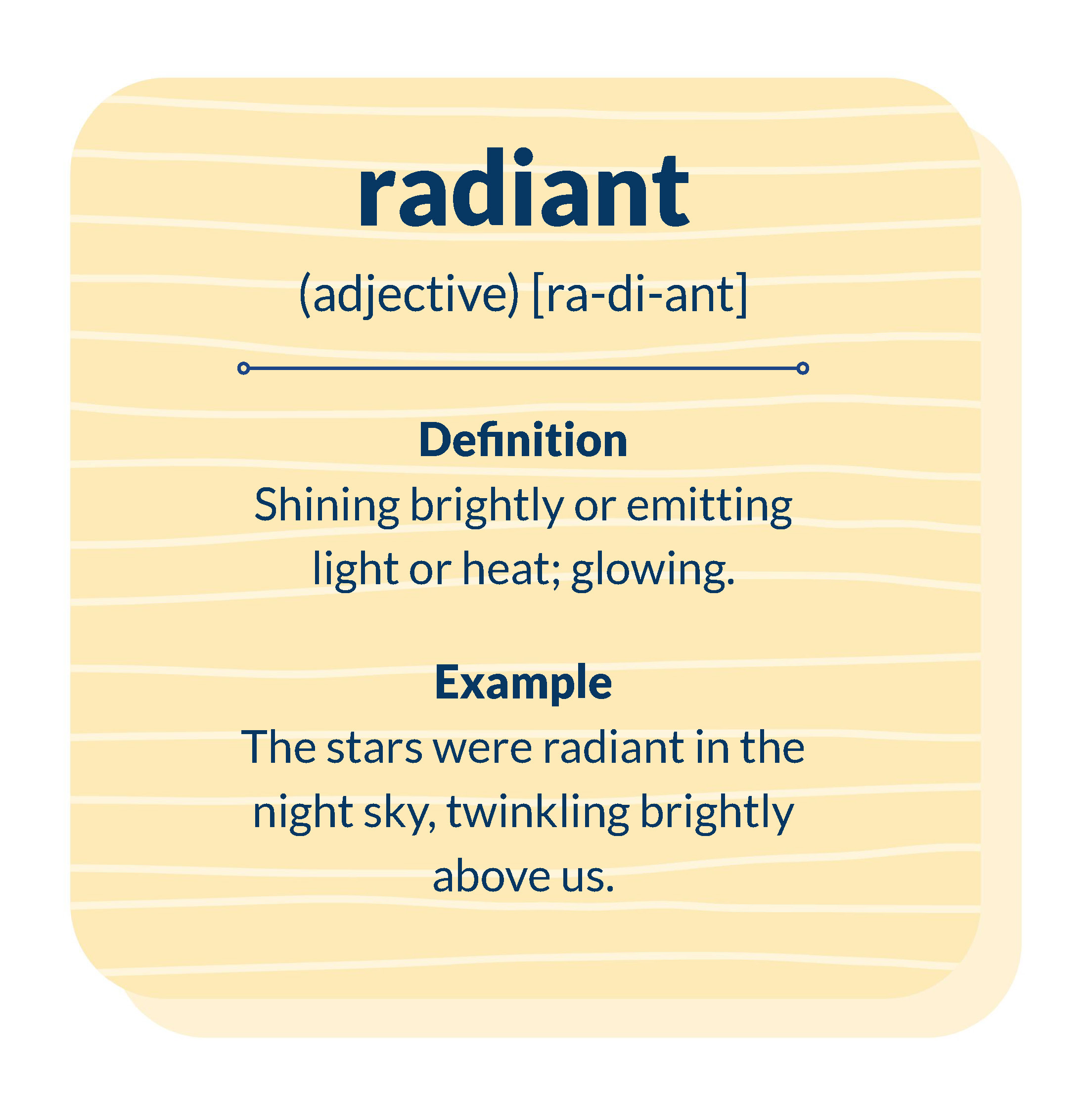
Shining brightly or emitting light or heat; glowing.
Example
The stars were radiant in the night sky, twinkling brightly above us.
cantankerous (adjective) [can-tan-ker-ous]
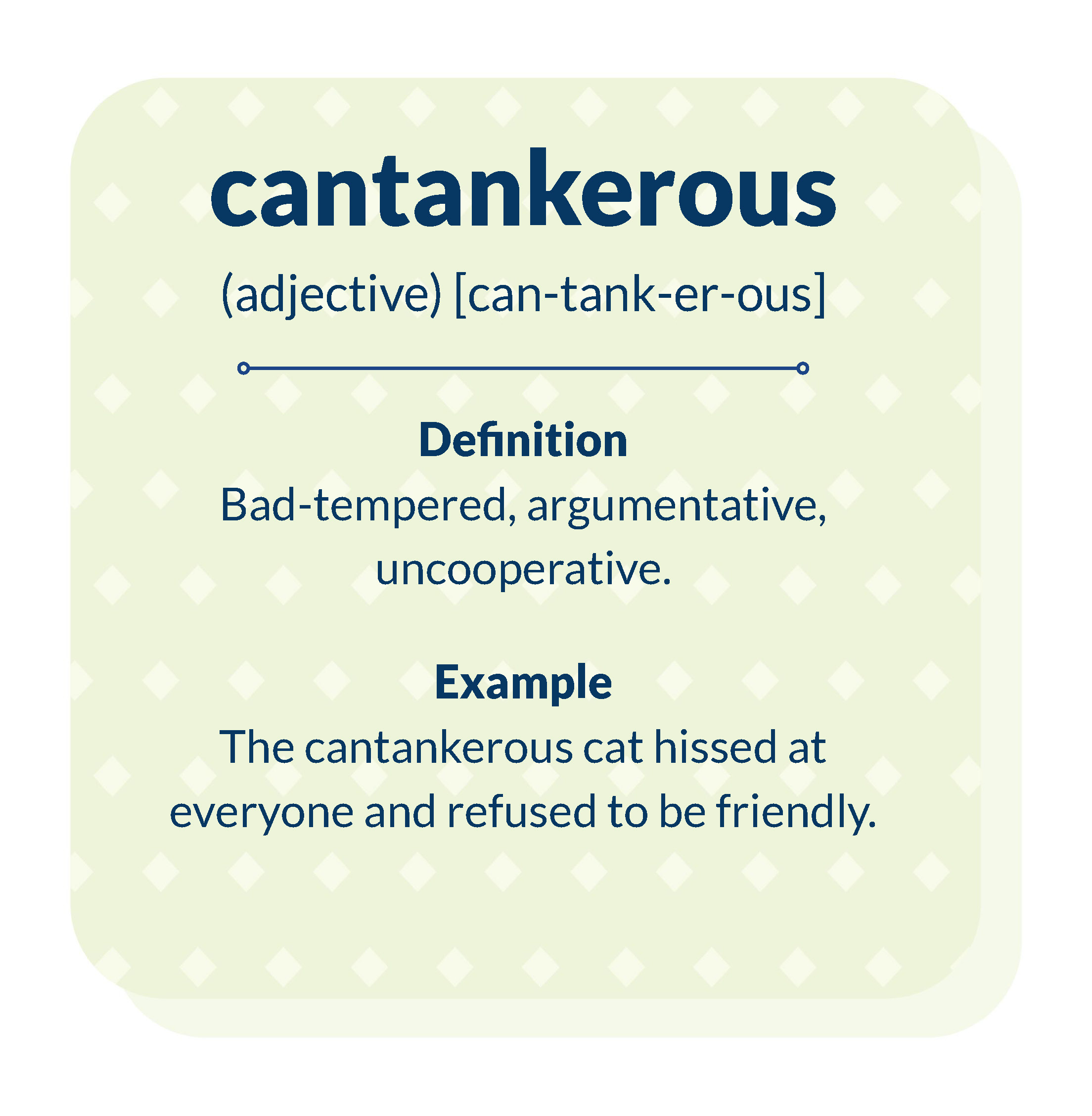
Bad-tempered, argumentative, uncooperative.
Example
The cantankerous cat hissed at everyone and refused to be friendly.
oblivious (adjective) [o-bliv-i-ous]
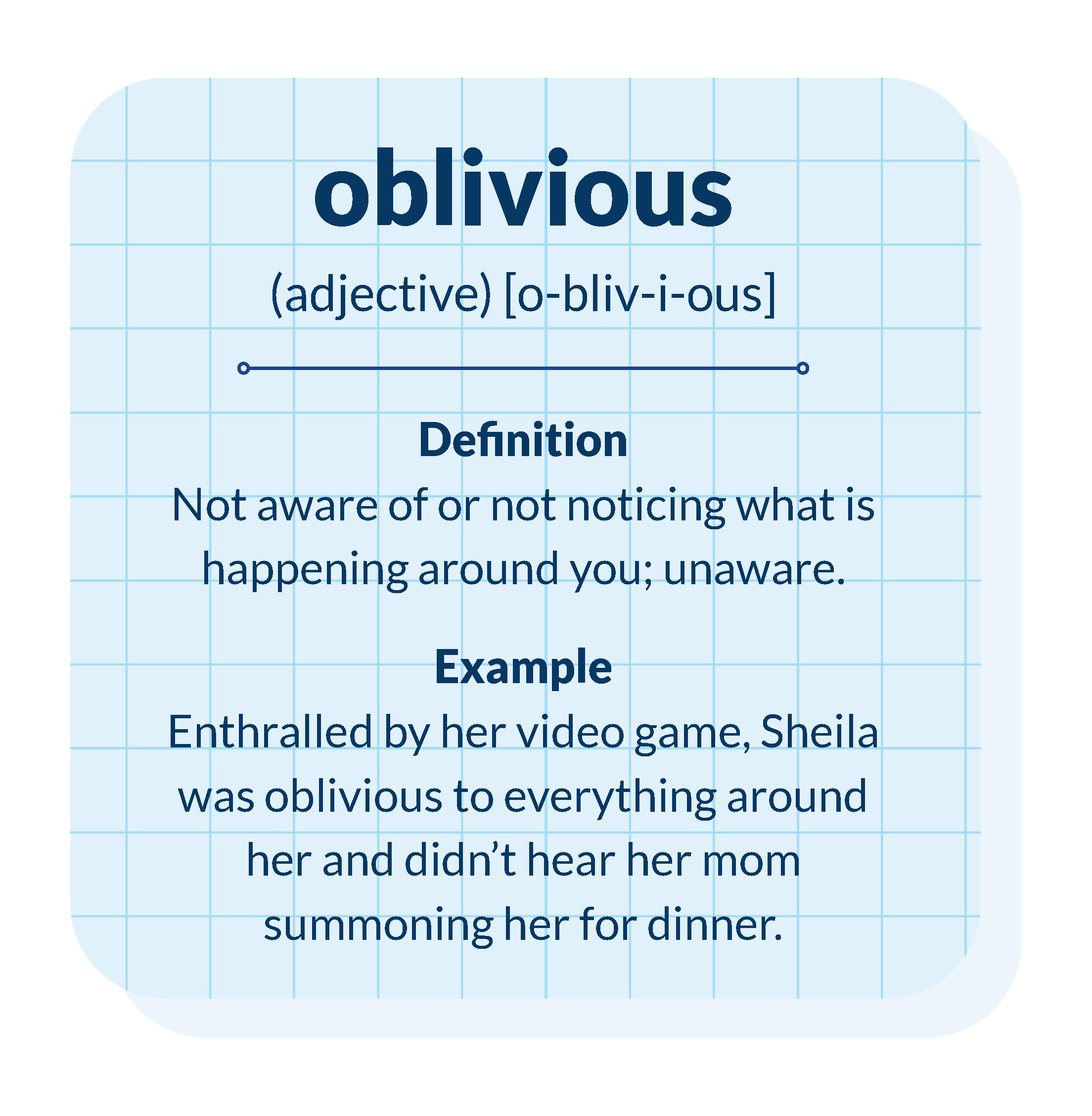
Not aware of or not noticing what is happening around you; unaware.
Example
Enthralled by her video game, Sheila was oblivious to everything around her and didn’t hear her mom summoning her for dinner.
quadruped (noun) [quad-ru-ped]
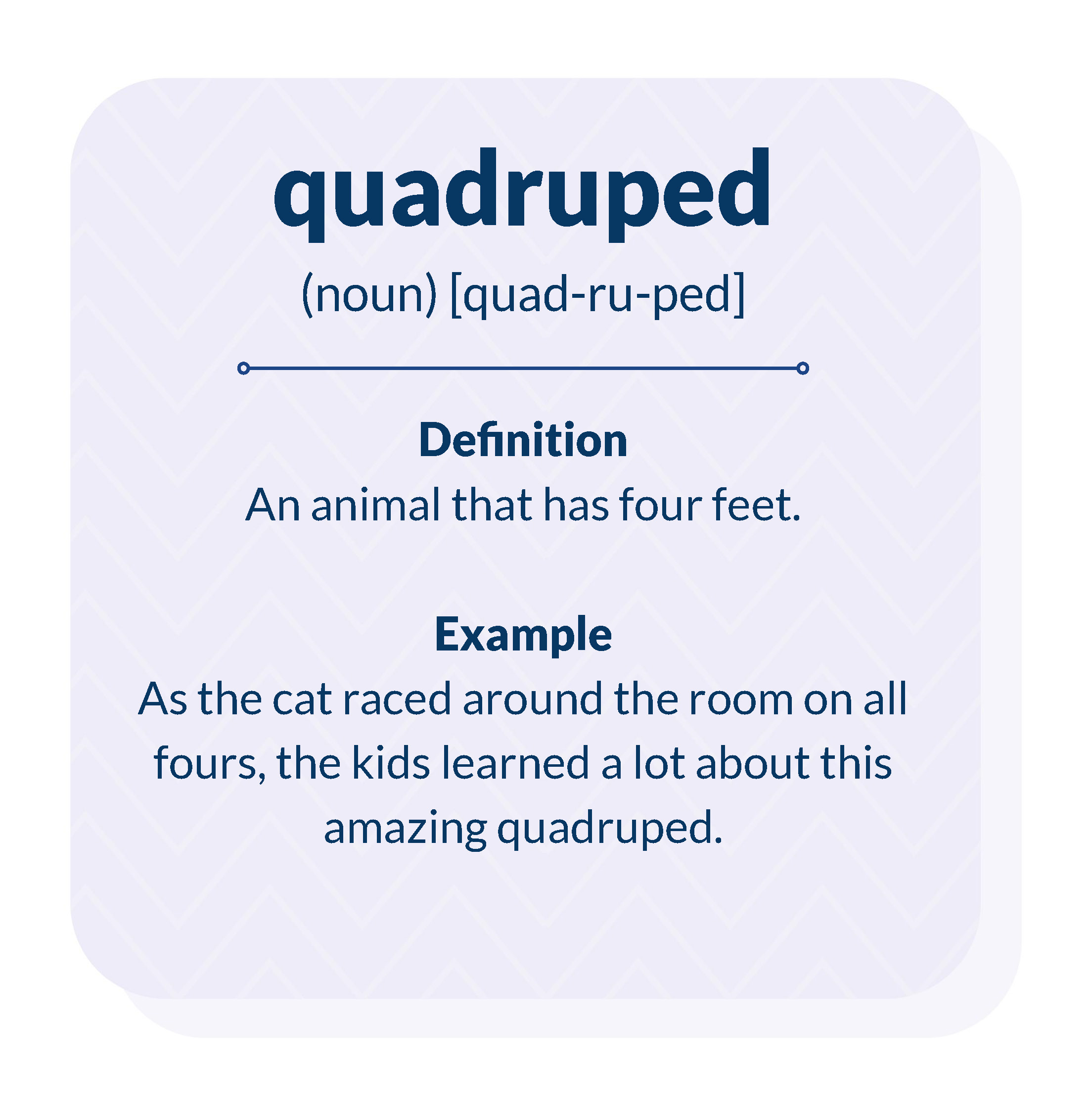
An animal that has four feet.
Example
As the cat raced around the room on all fours, the kids learned a lot about this amazing quadruped.
enthusiastic (adjective) [en-thu-si-as-tic]
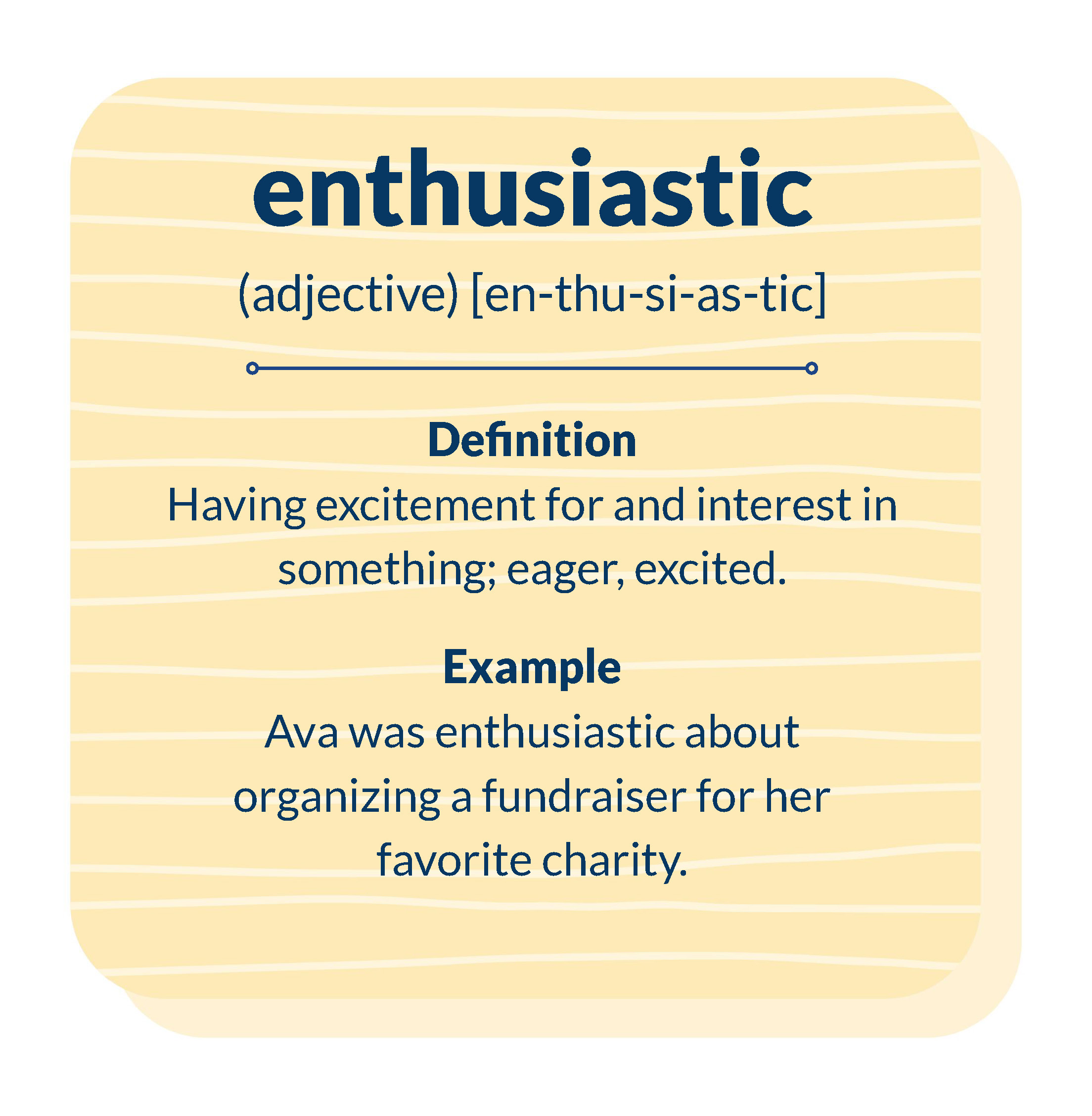
Having excitement for and interest in something; eager, excited.
Example
Ava was enthusiastic about organizing a fundraiser for her favorite charity.
remnant (noun) [rem-nant]
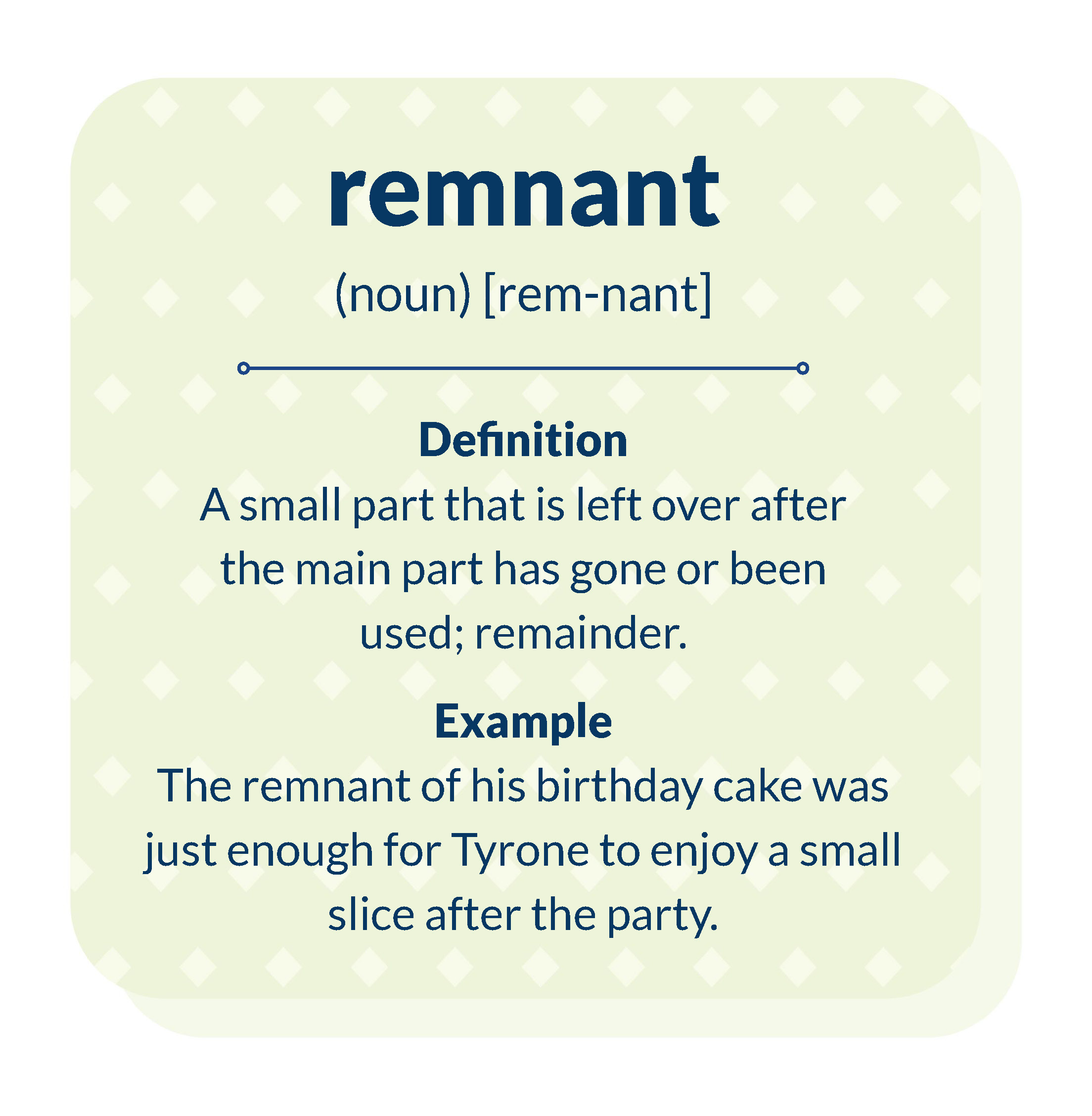
A small part that is left over after the main part has gone or been used; remainder.
Example
The remnant of his birthday cake was just enough for Tyrone to enjoy a small slice after the party.
zeal (noun) [zeal]
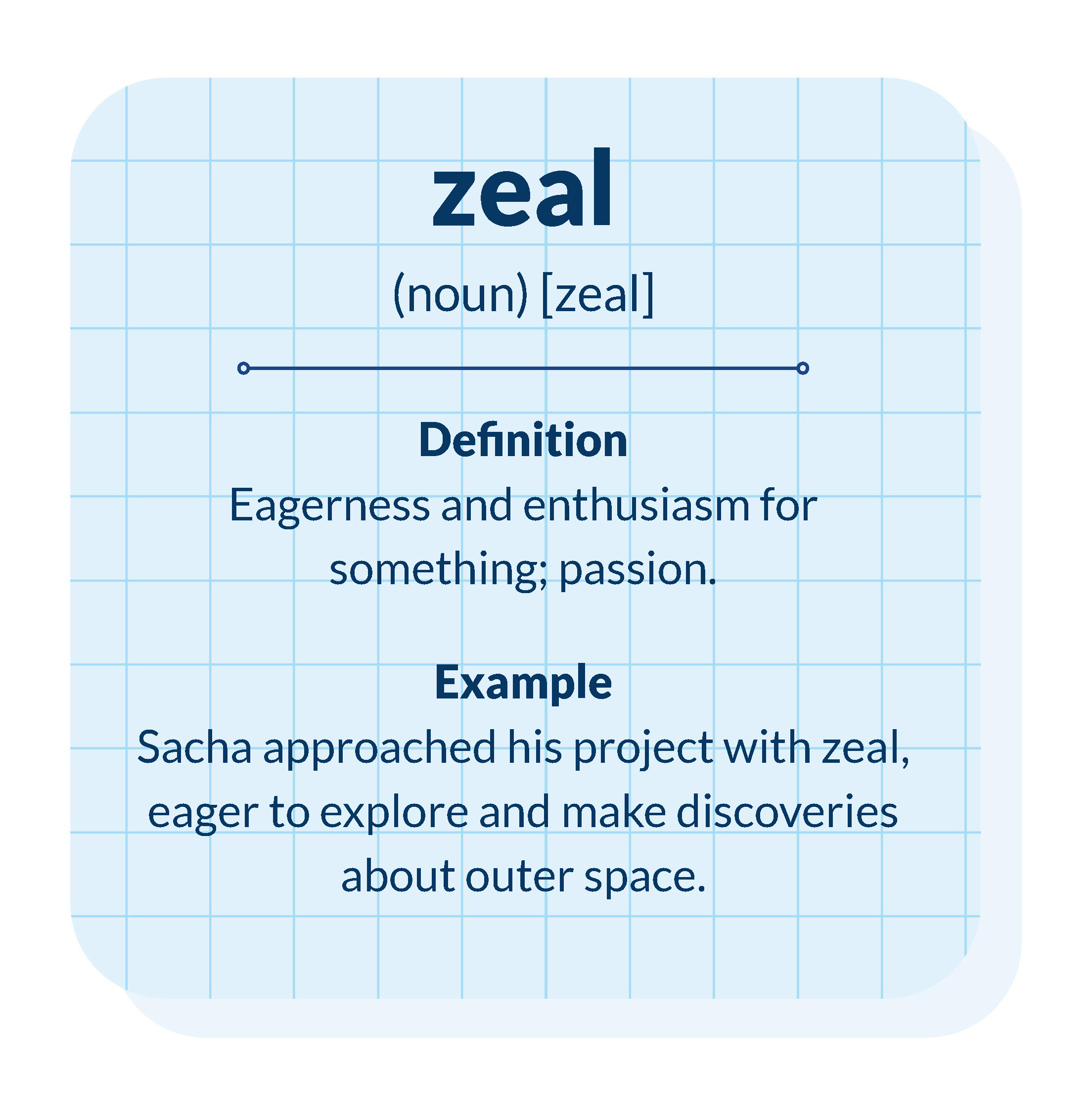
Eagerness and enthusiasm for something; passion.
Example
Sacha approached his project with zeal, eager to explore and make discoveries about outer space.
oblige (verb) [o-blige]
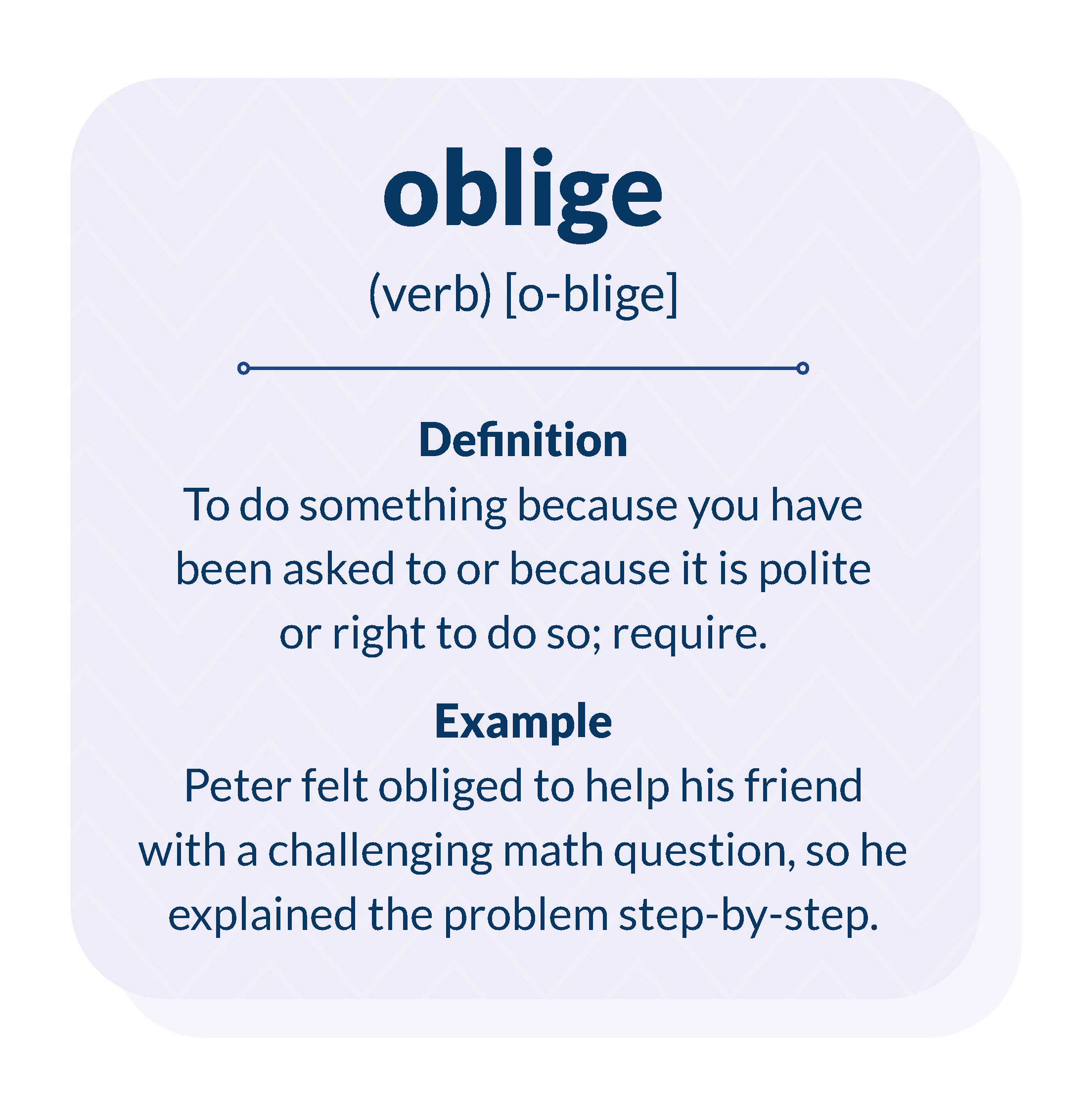
To do something because you have been asked to or because it is polite or right to do so; require.
Example
Peter felt obliged to help his friend with a challenging math question, so he explained the problem step-by-step.
tarnish (verb) [tar-nish]
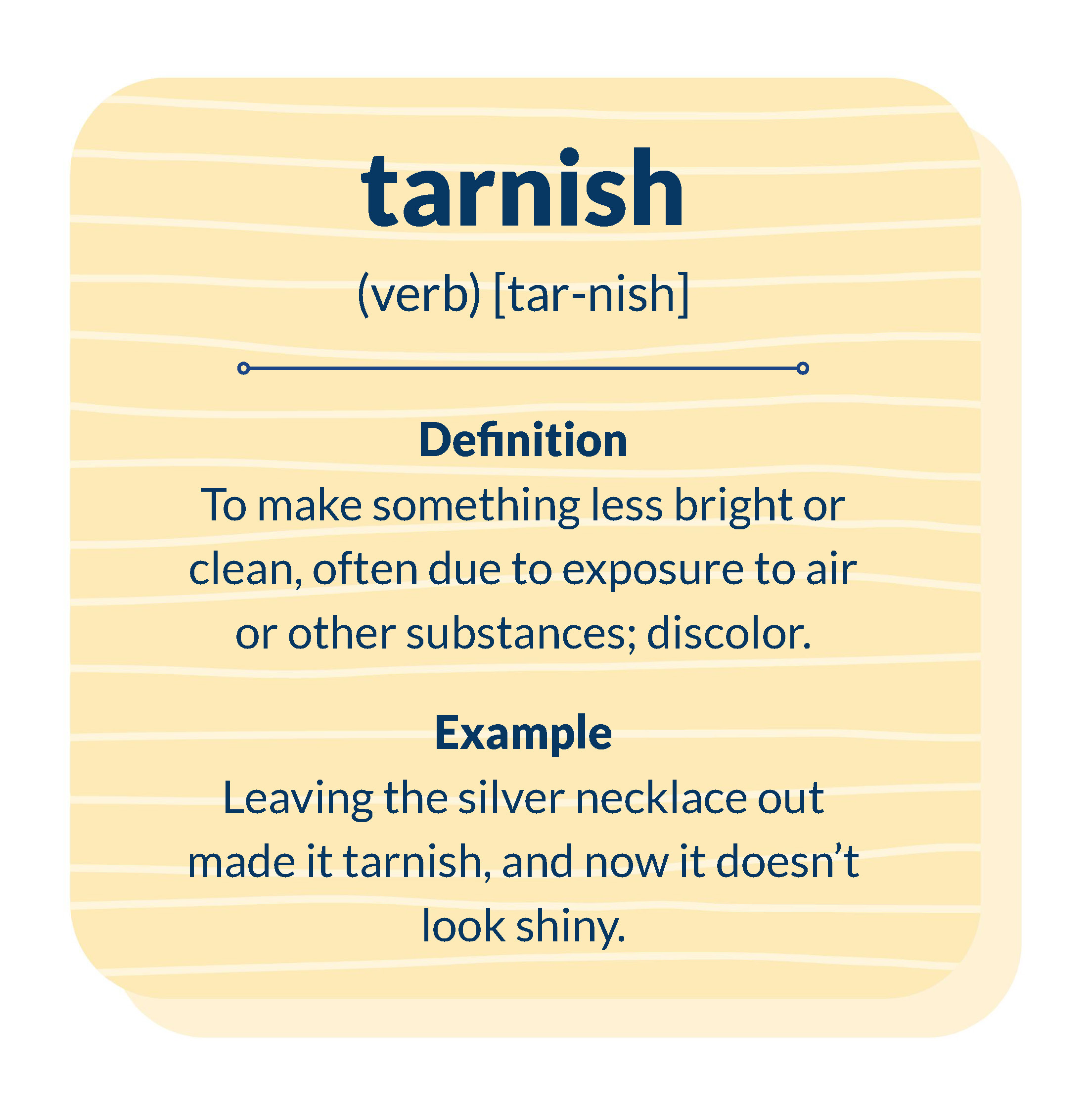
To make something less bright or clean, often due to exposure to air or other substances; discolor.
Example
Leaving the silver necklace out made it tarnish, and now it doesn’t look shiny.
dwindle (verb) [dwin-dle]
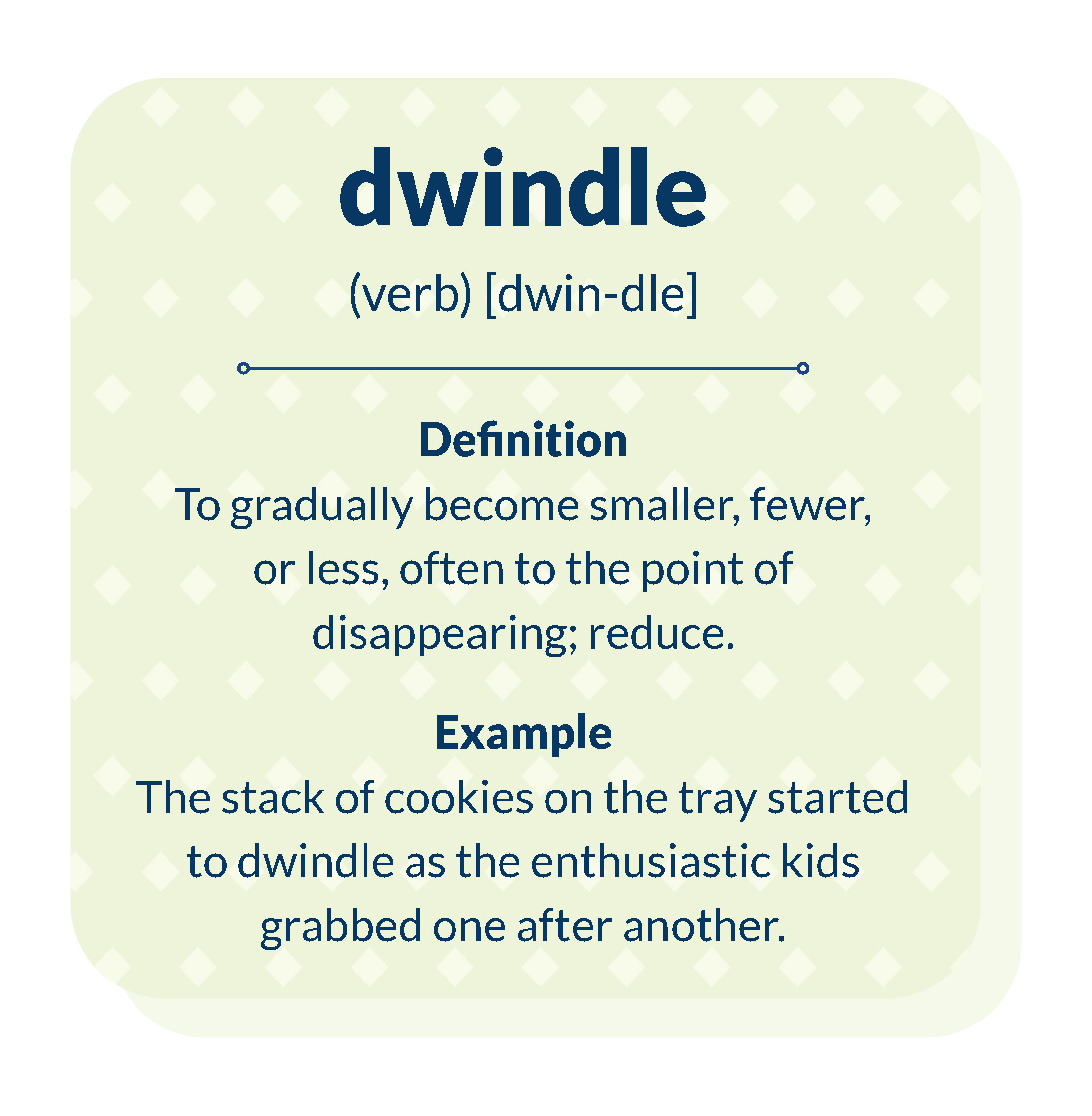
To gradually become smaller, fewer, or less, often to the point of disappearing; reduce.
Example
The stack of cookies on the tray started to dwindle as the enthusiastic kids grabbed one after another.
prohibit (verb) [pro-hi-bit]
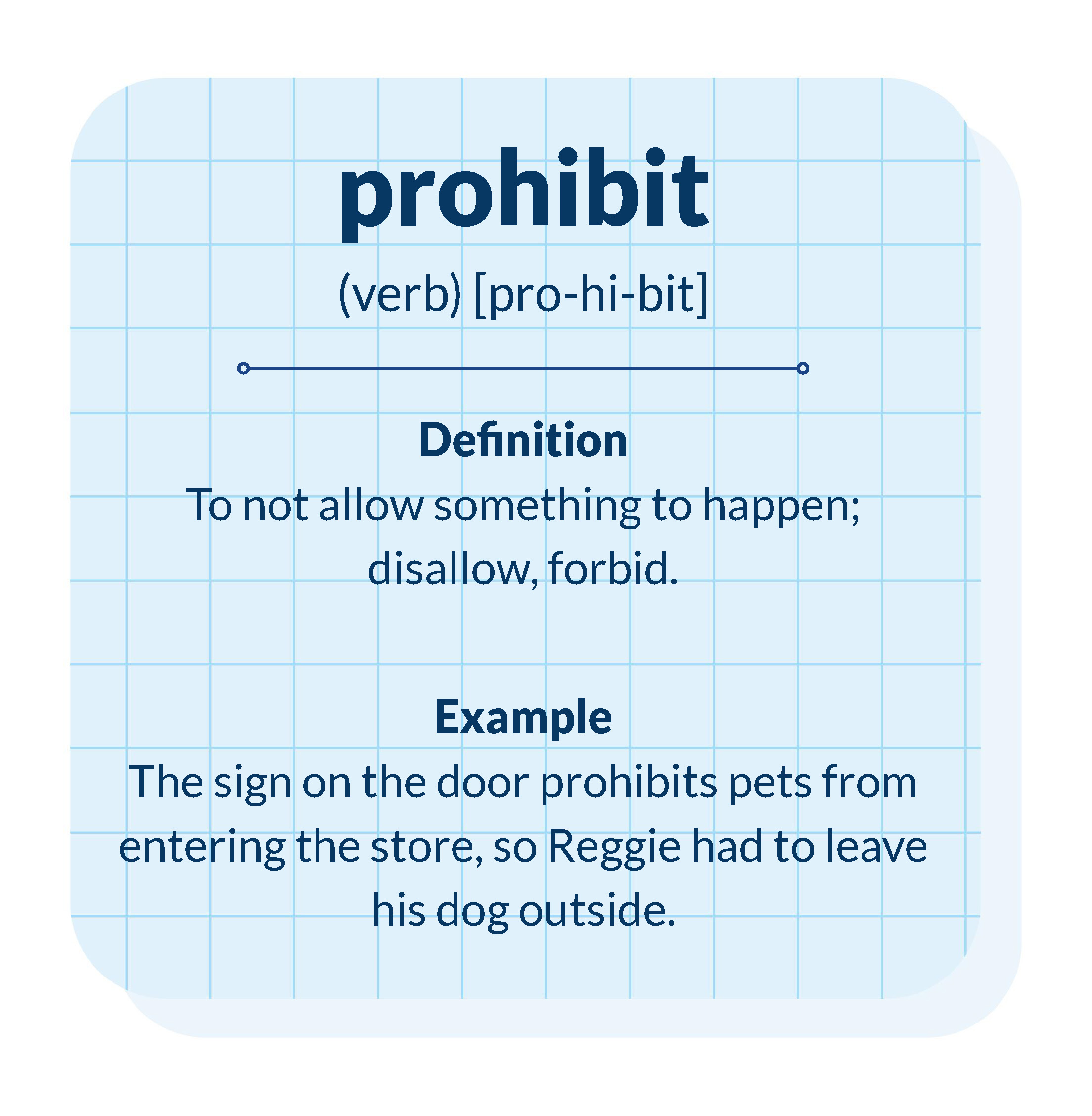
To not allow something to happen; disallow, forbid.
Example
The sign on the door prohibits pets from entering the store, so Reggie had to leave his dog outside.
askew (adjective or adverb) [a-skew]
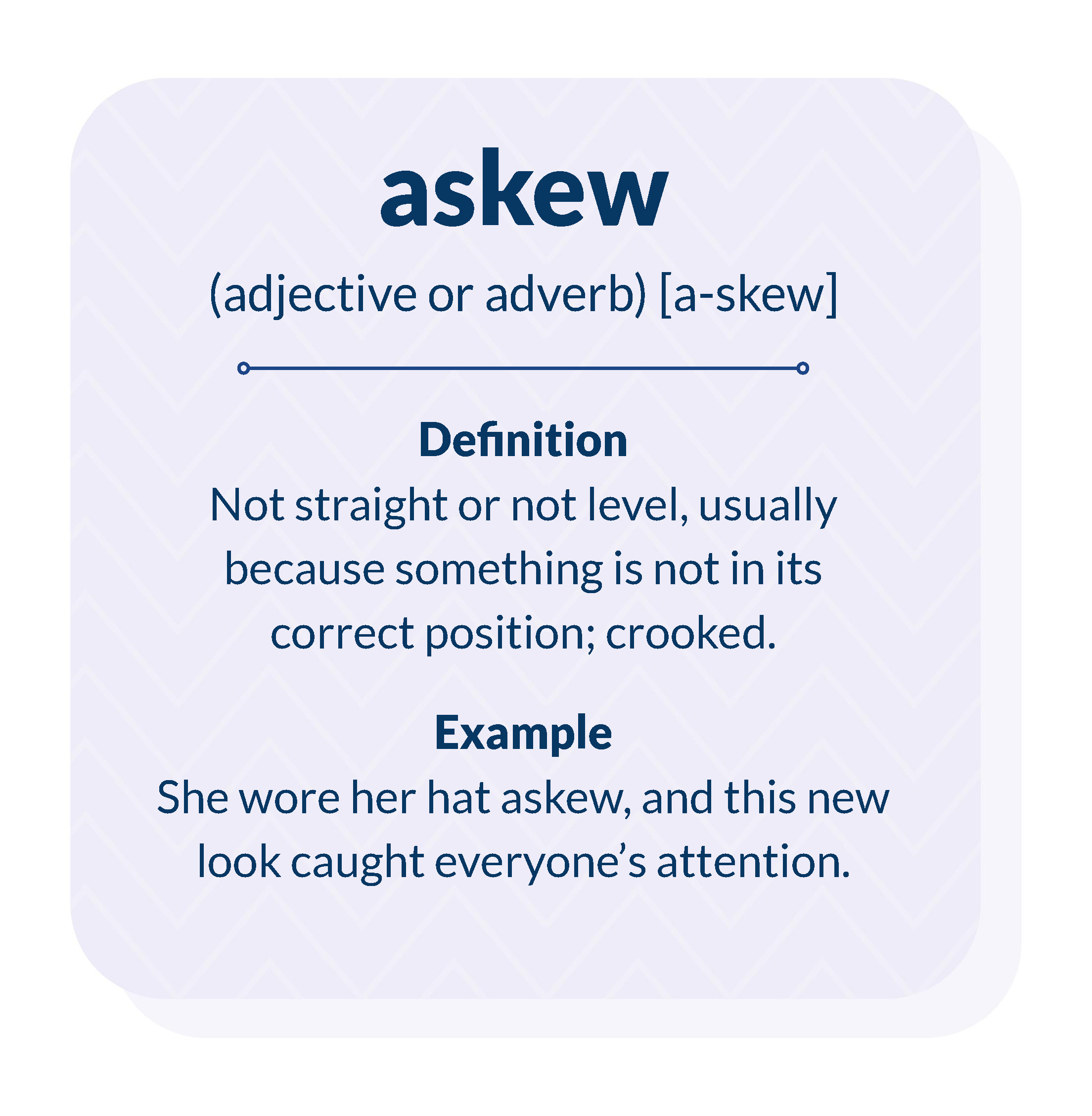
Not straight or not level, usually because something is not in its correct position; crooked.
Example
She wore her hat askew, and this new look caught everyone’s attention.
xanthic (adjective) [xan-thic]
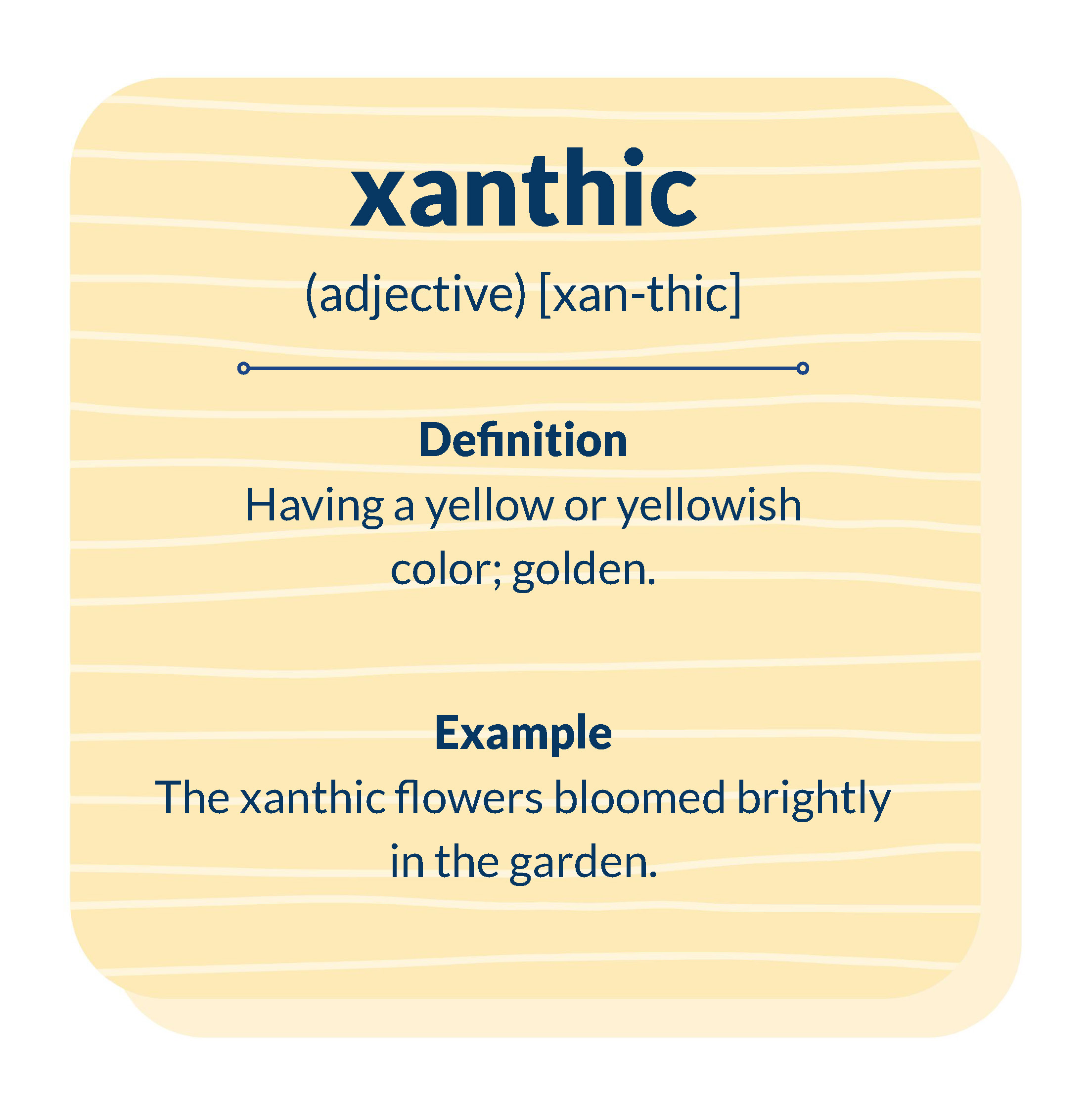
Having a yellow or yellowish color; golden.
Example
The xanthic flowers bloomed brightly in the garden.
clamor (noun) [clam-or]
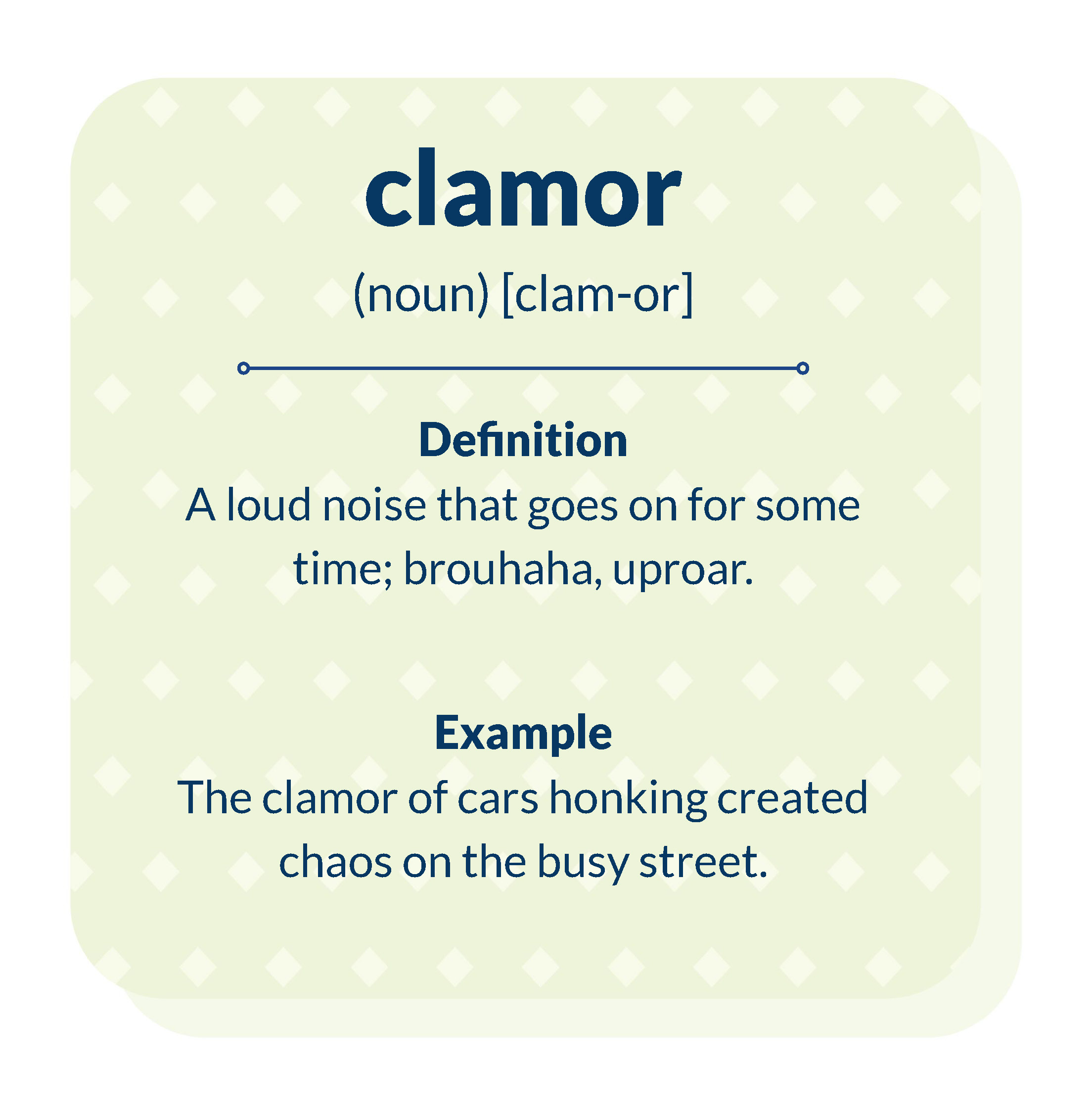
A loud noise that goes on for some time; brouhaha, uproar.
Example
The clamor of cars honking created chaos on the busy street.
experiential (adjective) [ex-pe-ri-en-tial]
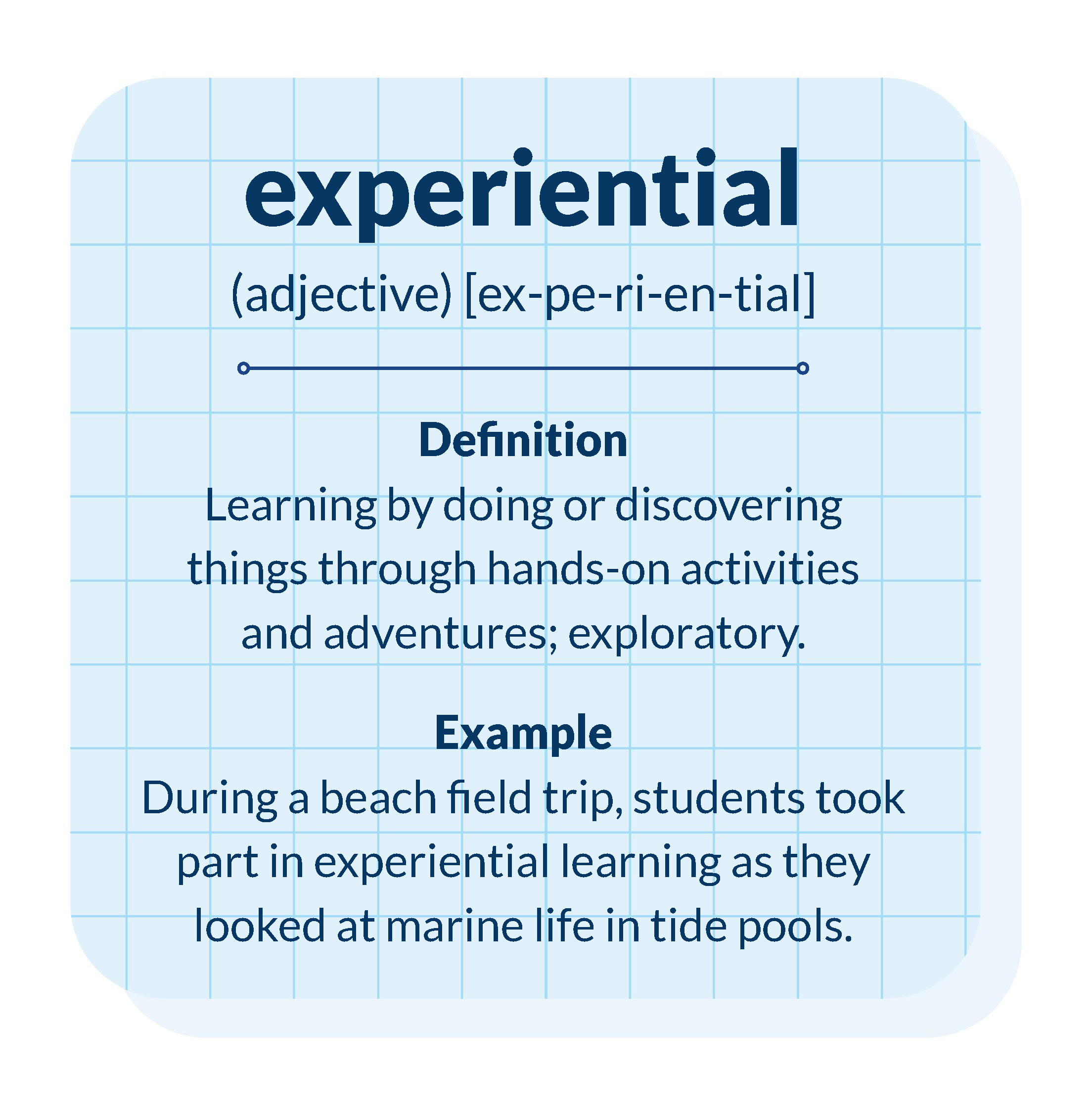
Learning by doing or discovering things through hands-on activities and adventures; exploratory.
Example
During a beach field trip, students took part in experiential learning as they looked at marine life in tide pools.
ominous (adjective) [om-i-nous]
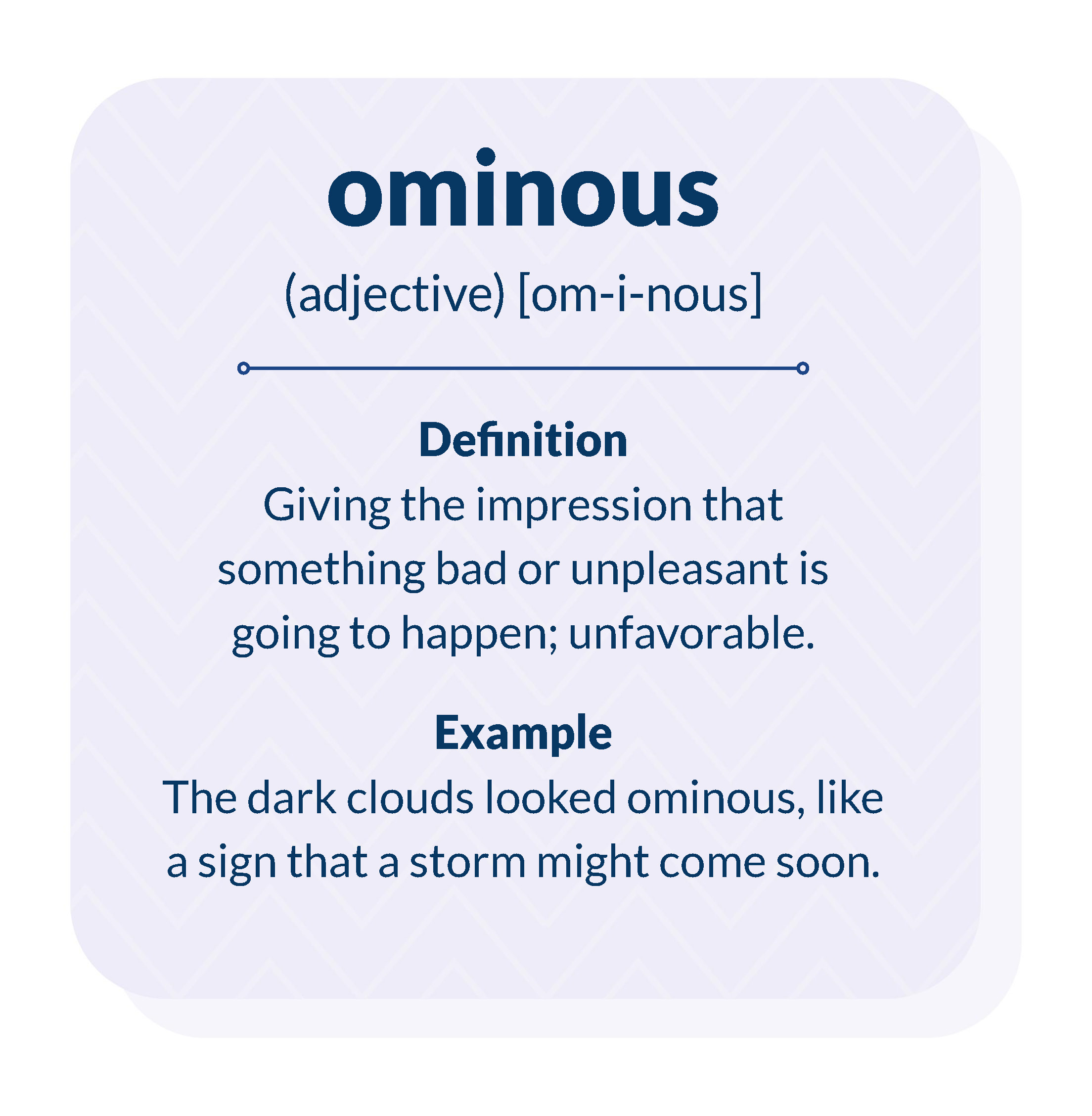
Giving the impression that something bad or unpleasant is going to happen; unfavorable.
Example
The dark clouds looked ominous, like a sign that a storm might come soon.
chortle (verb) [chor-tle]
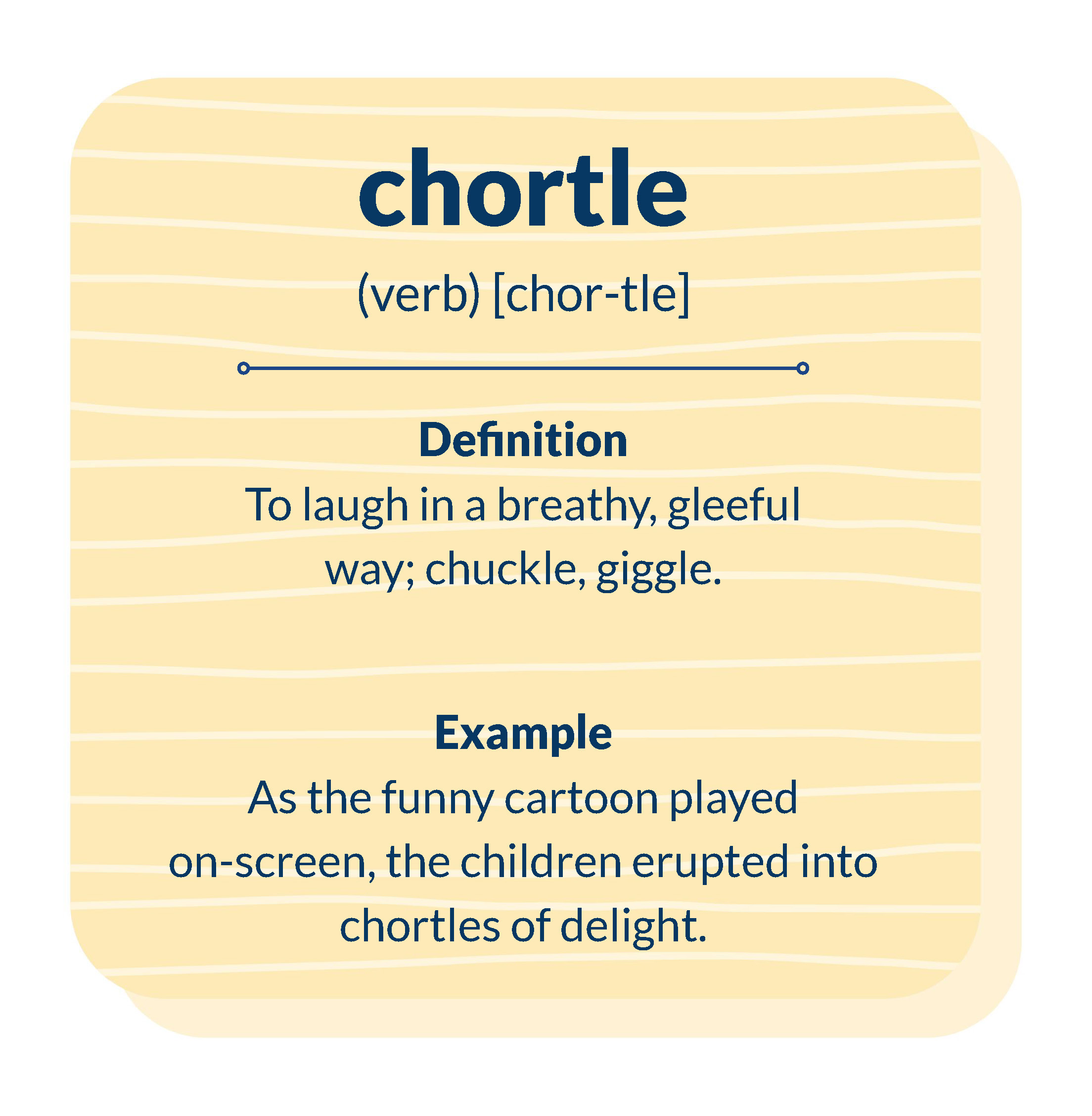
To laugh in a breathy, gleeful way; chuckle, giggle.
Example
As the funny cartoon played on-screen, the children erupted into chortles of delight.
dormant (adjective) [dor-mant]
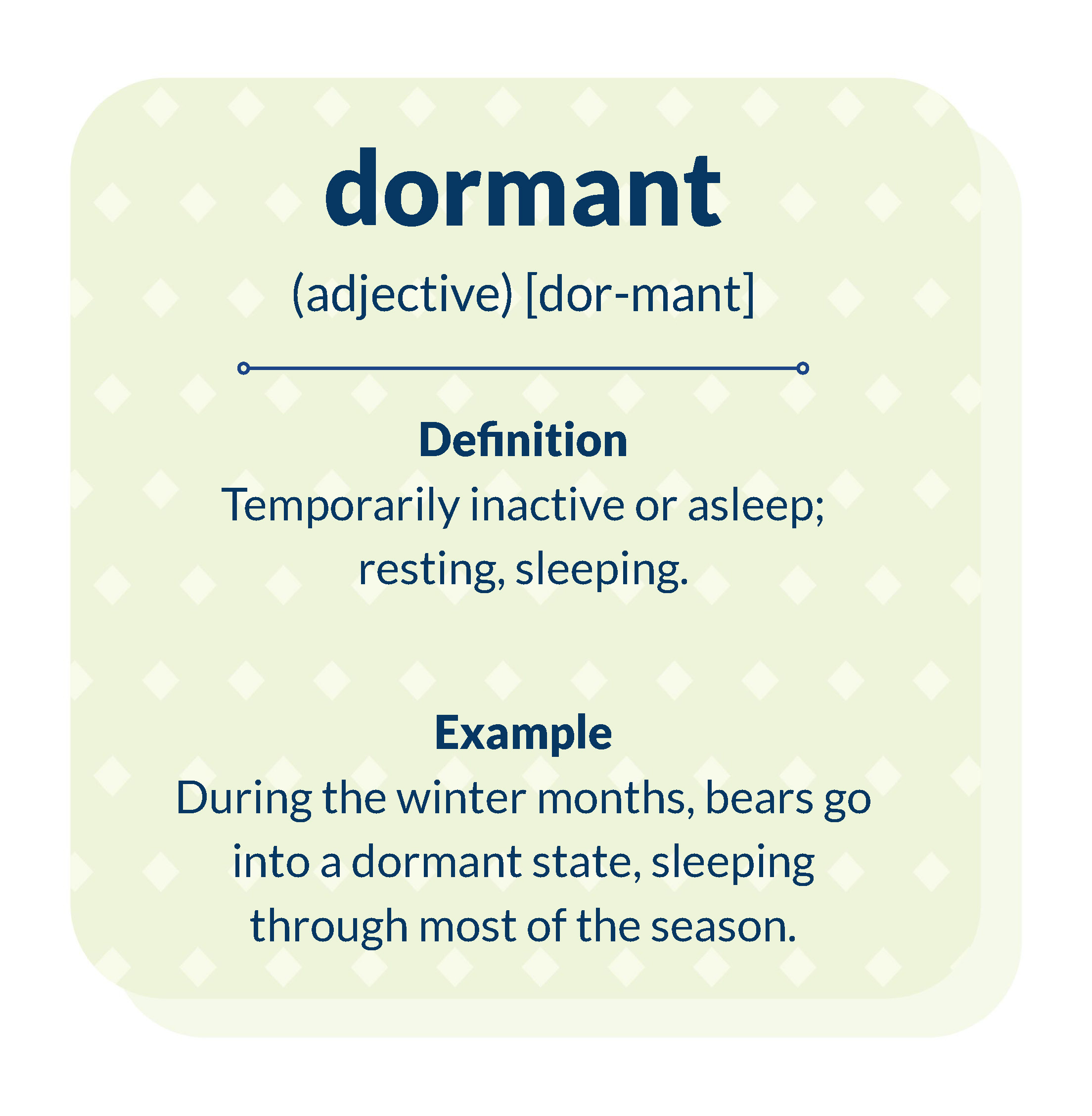
Temporarily inactive or asleep; resting, sleeping.
Example
During the winter months, bears go into a dormant state, sleeping through most of the season.
mend (verb) [mend]
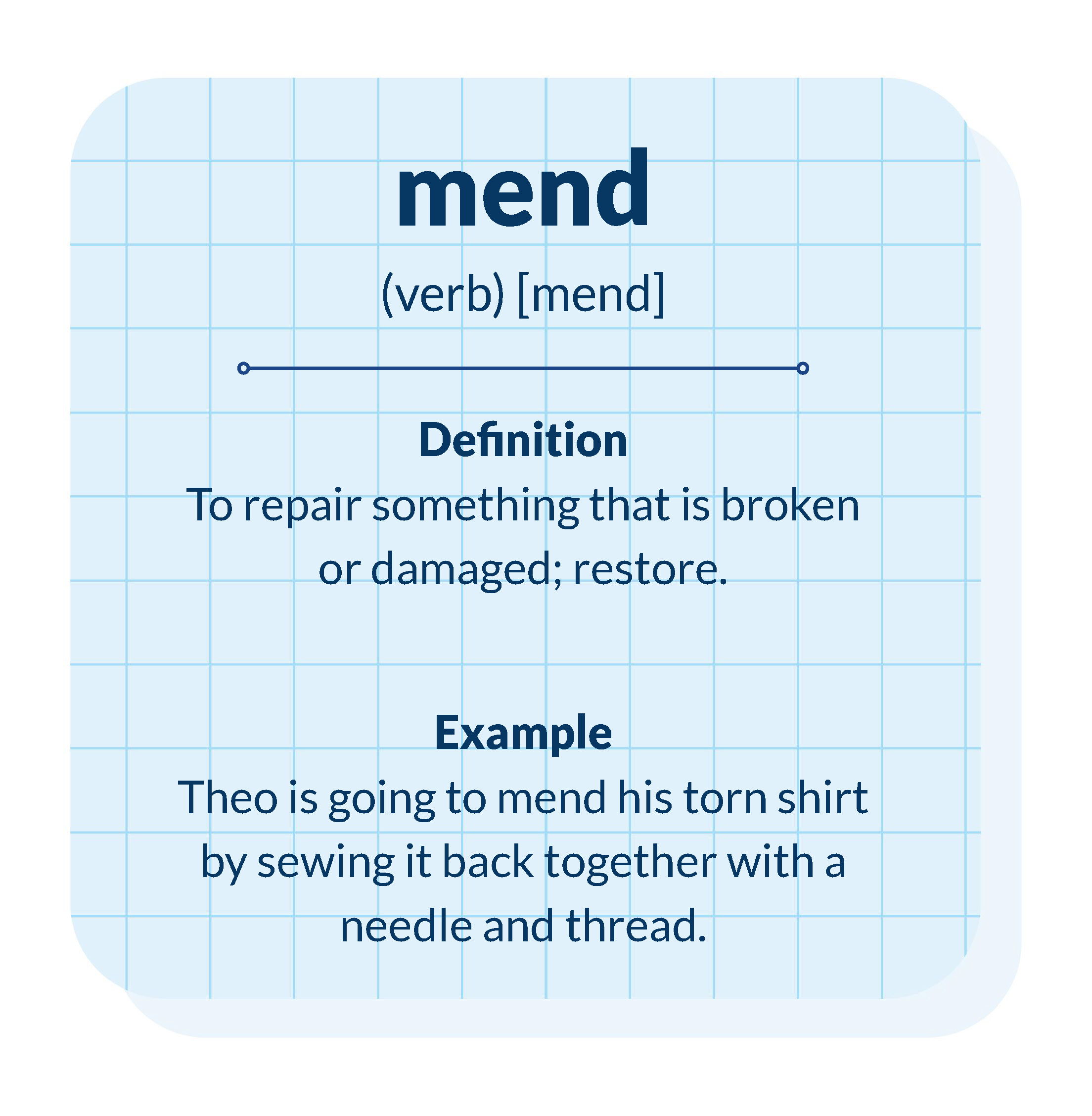
To repair something that is broken or damaged; restore.
Example
Theo is going to mend his torn shirt by sewing it back together with a needle and thread.
quarrel (noun) [quar-rel]
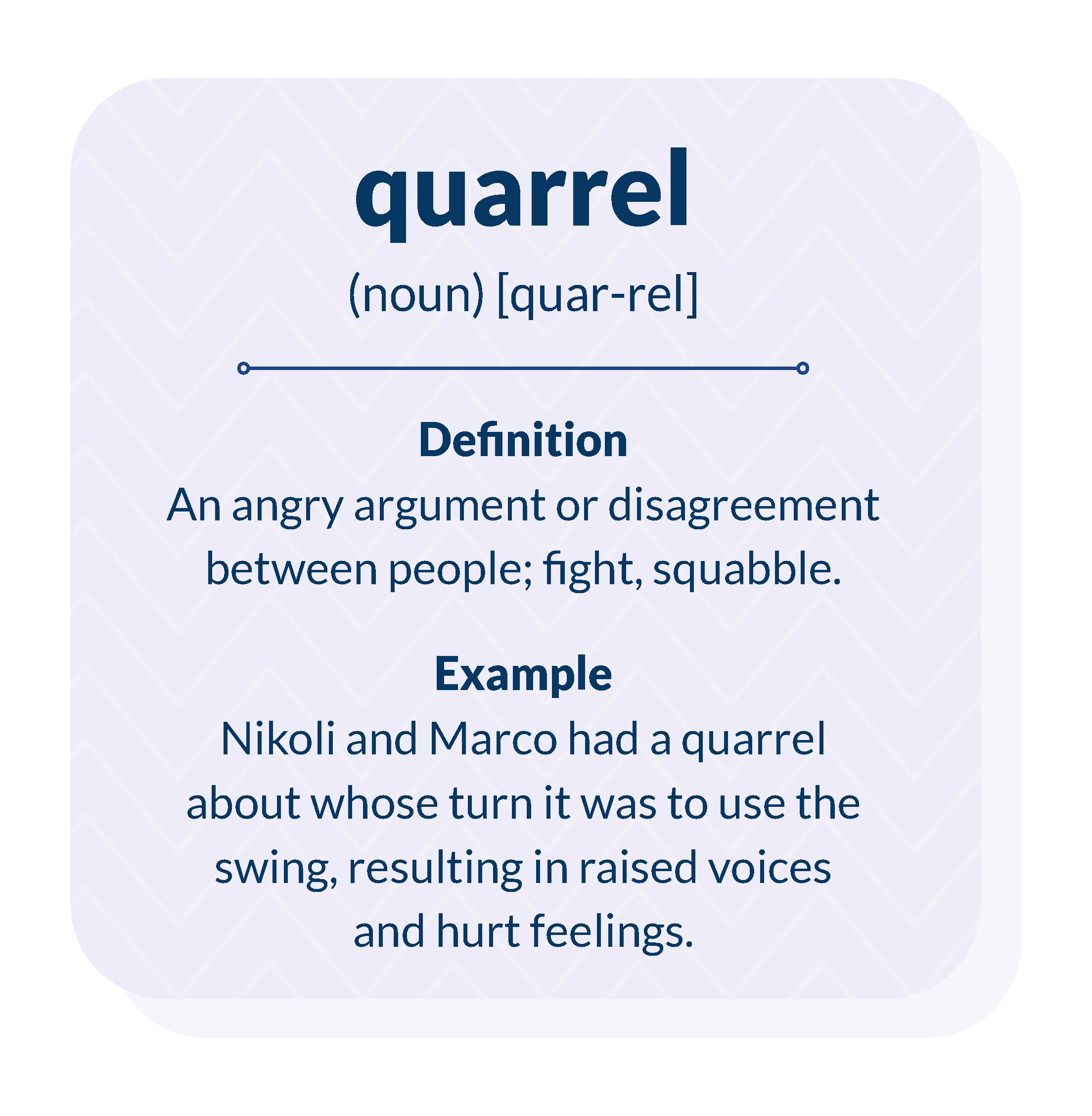
An angry argument or disagreement between people; fight, squabble.
Example
Nick and Marco had a quarrel about whose turn it was to use the swing, resulting in raised voices and hurt feelings.
zephyr (noun) [zeph-yr]
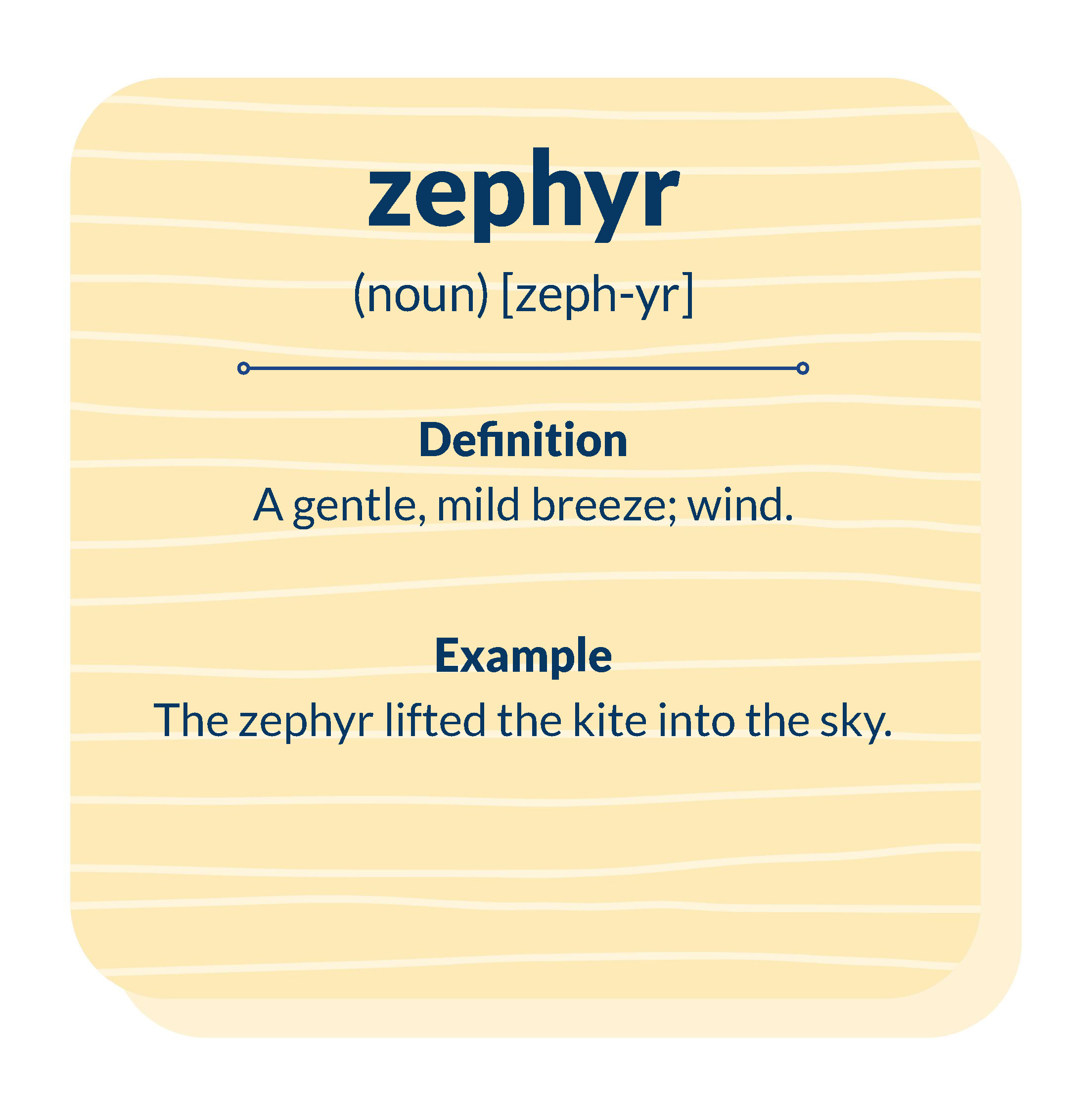
A gentle, mild breeze; wind.
Example
The zephyr lifted the kite into the sky.
distribute (verb) [dis-trib-ute]
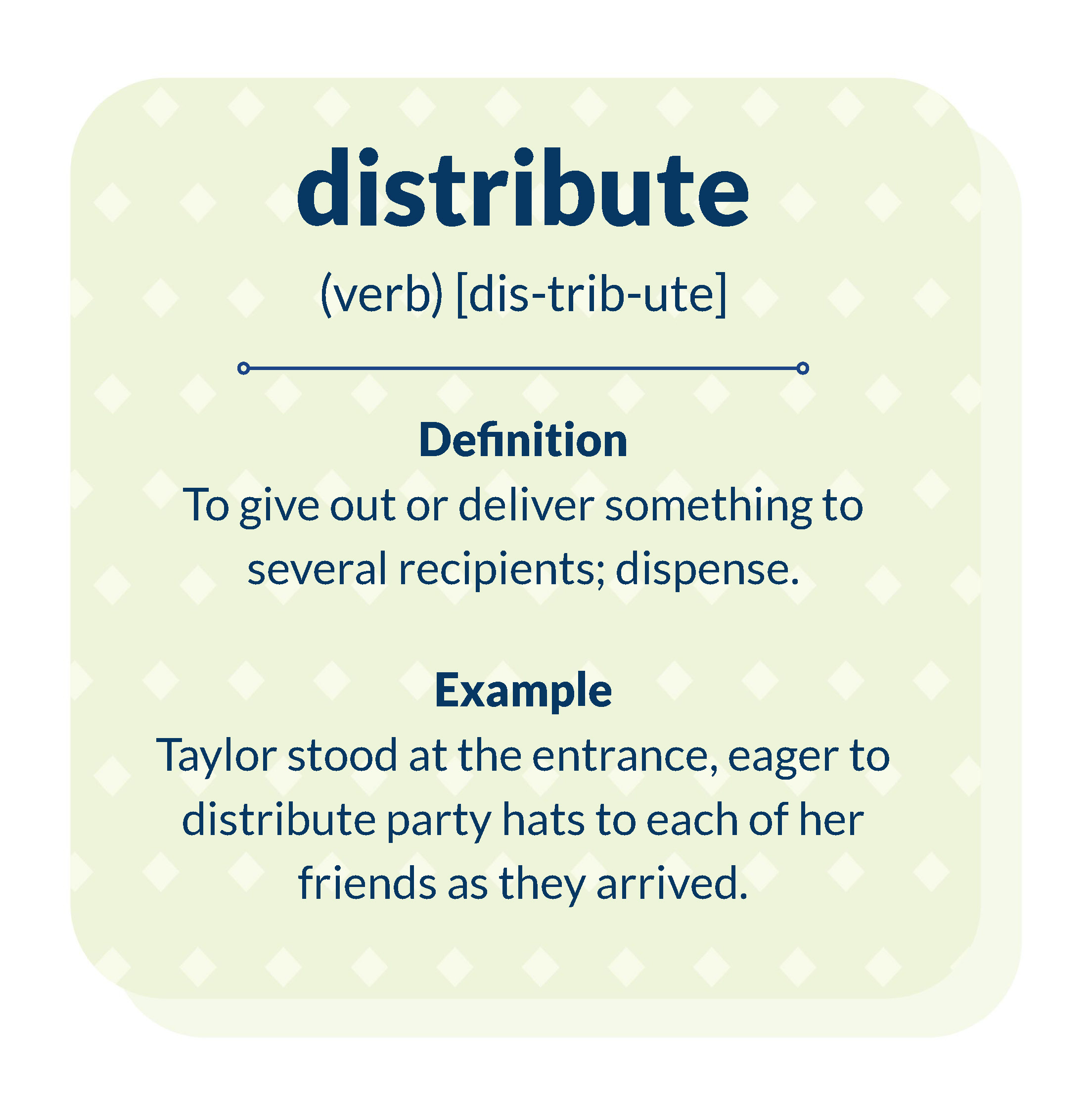
To give out or deliver something to several recipients; dispense.
Example
Taylor stood at the entrance, eager to distribute party hats to each of her friends as they arrived.
crucial (adjective) [cru-cial]
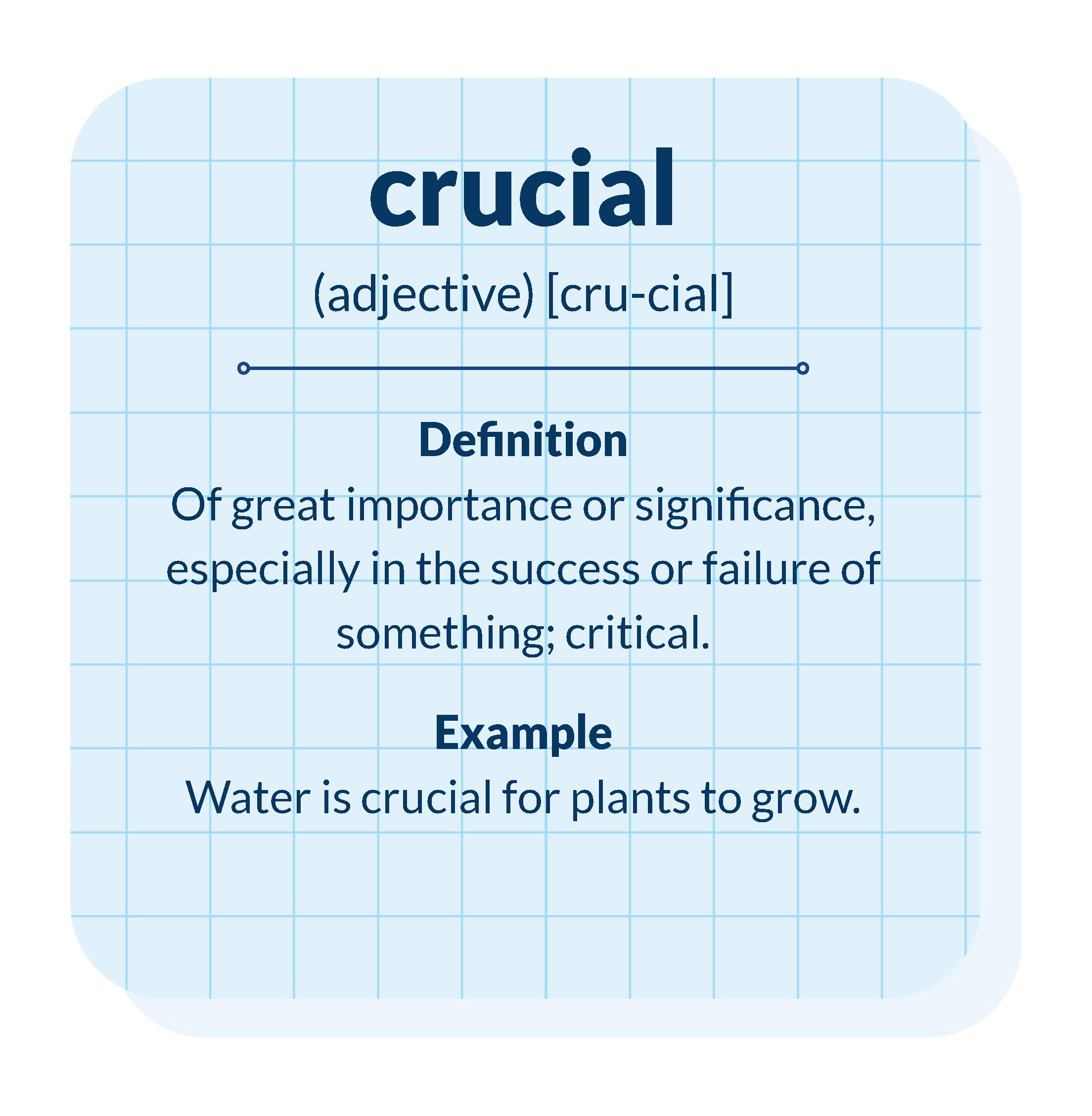
Of great importance or significance, especially in the success or failure of something; critical.
Example
Water is crucial for plants to grow.
modest (adjective) [mod-est]
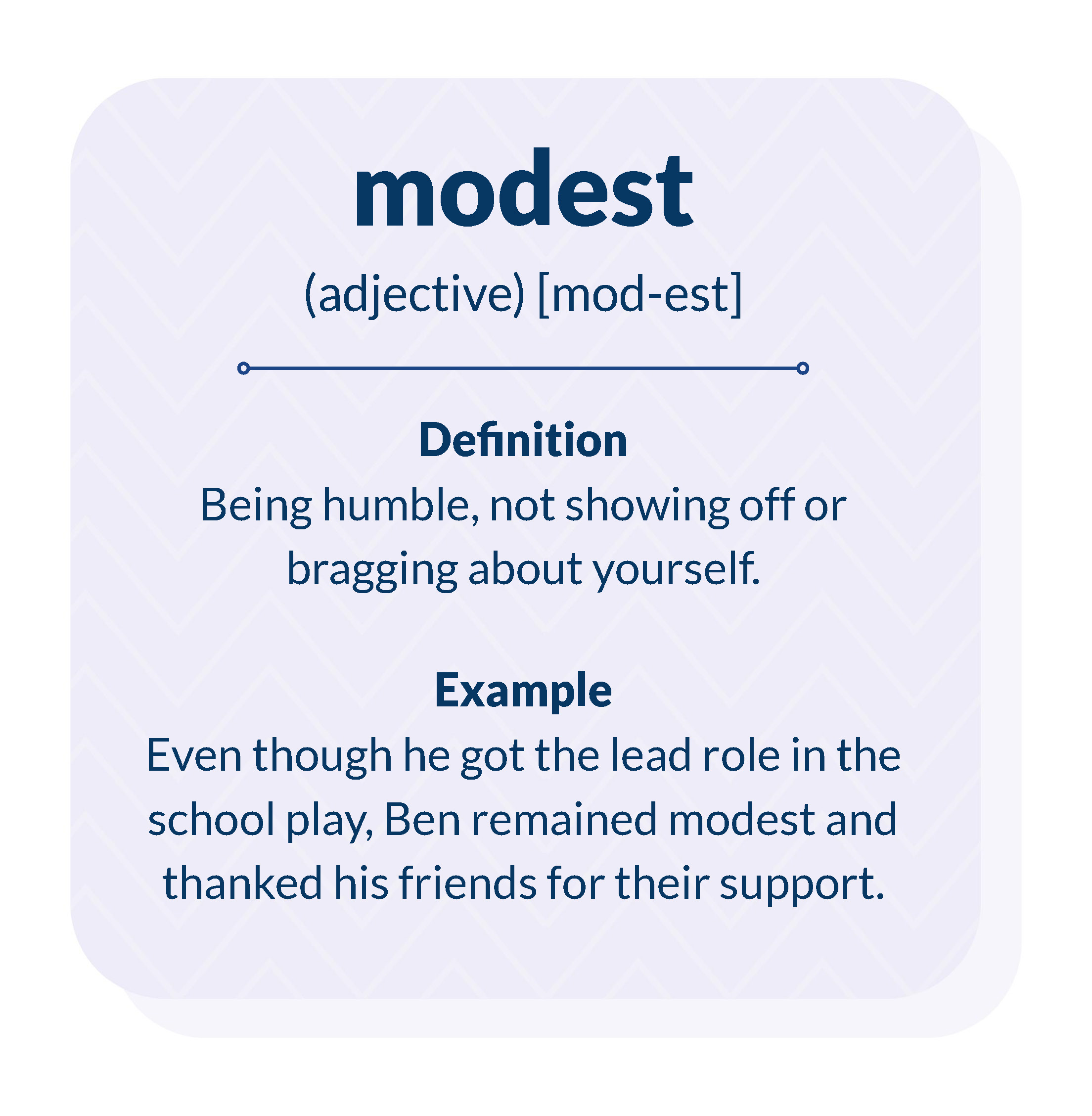
Being humble, not showing off or bragging about yourself.
Example
Even though he got the lead role in the school play, Ben remained modest and thanked his friends for their support.
sympathy (noun) [sym-pa-thy]
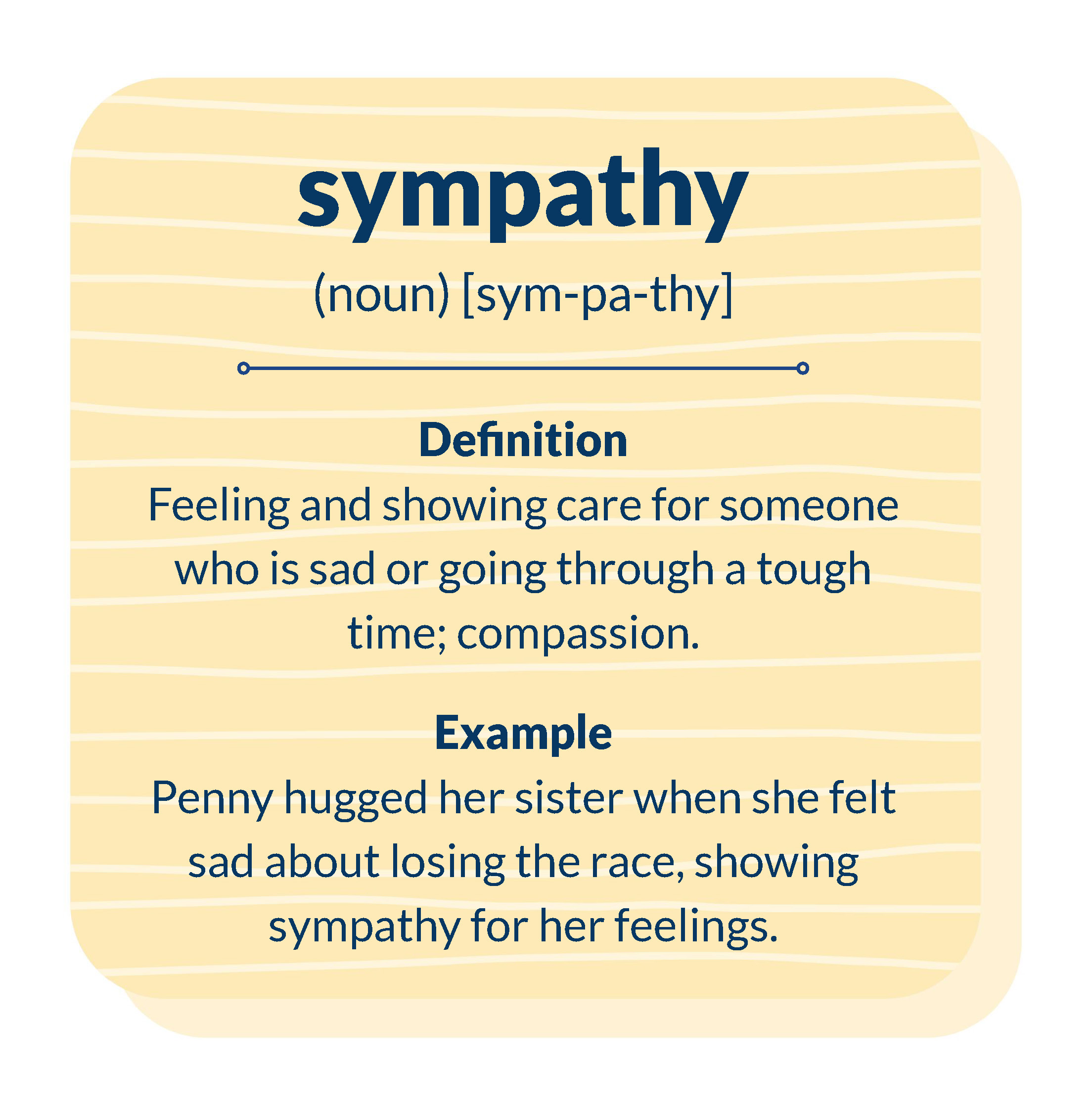
Understanding and caring about someone’s feelings when they’re sad or going through a tough time; compassion.
Example
Penny hugged her sister when she felt sad about losing the race, showing sympathy for her feelings.
Get Your Free Word of the Week Google Slides
Just fill out the form on this page to get our free Word of the Week Google Slides featuring all 52 of the words and definitions above.

